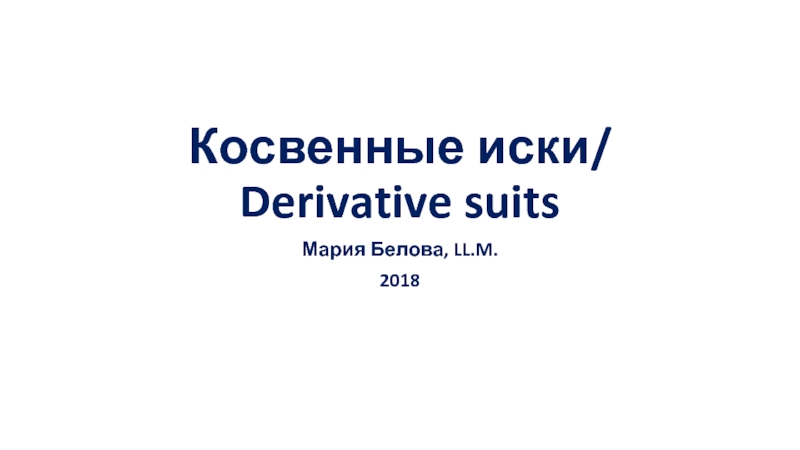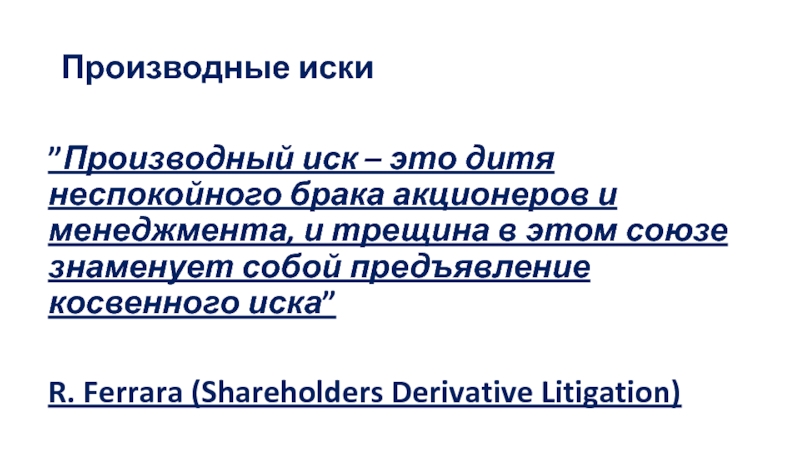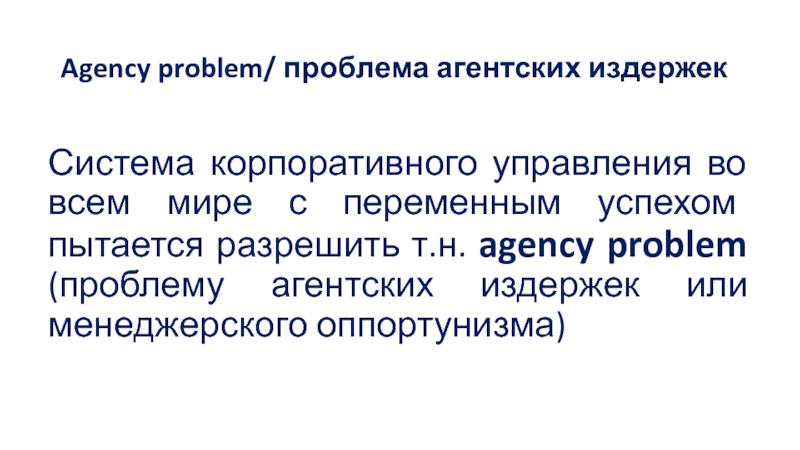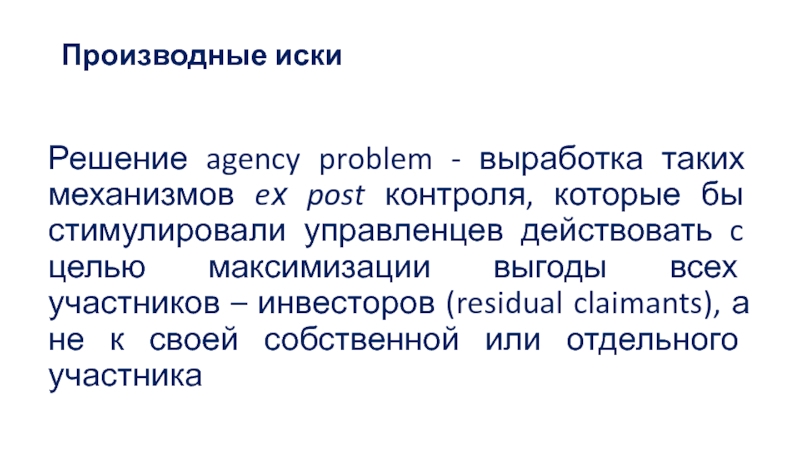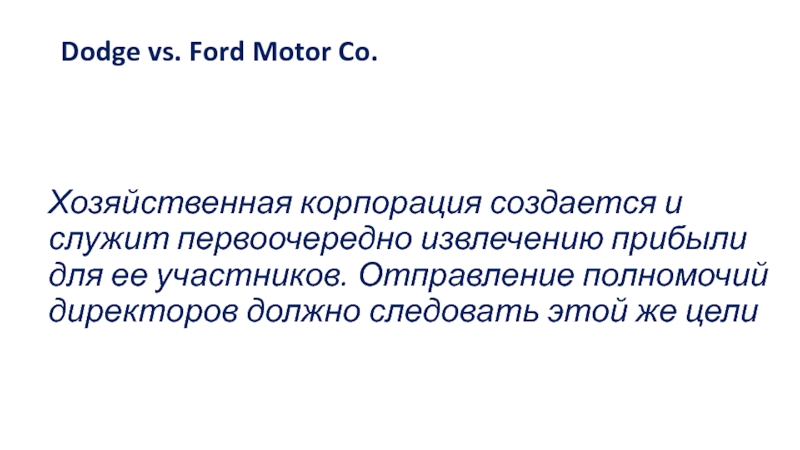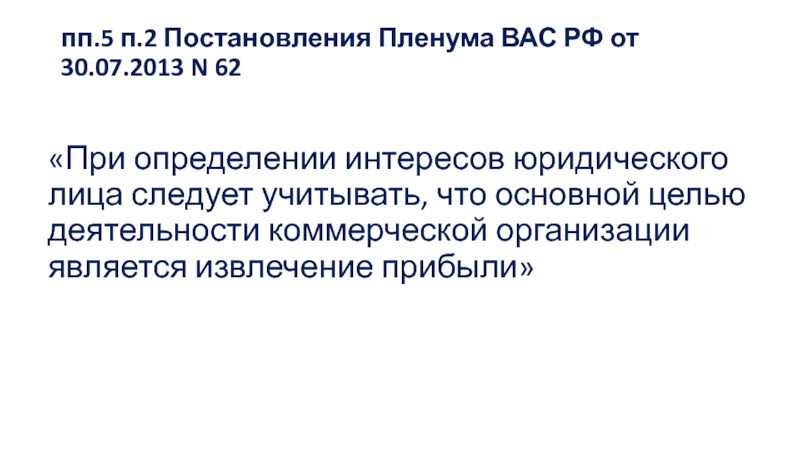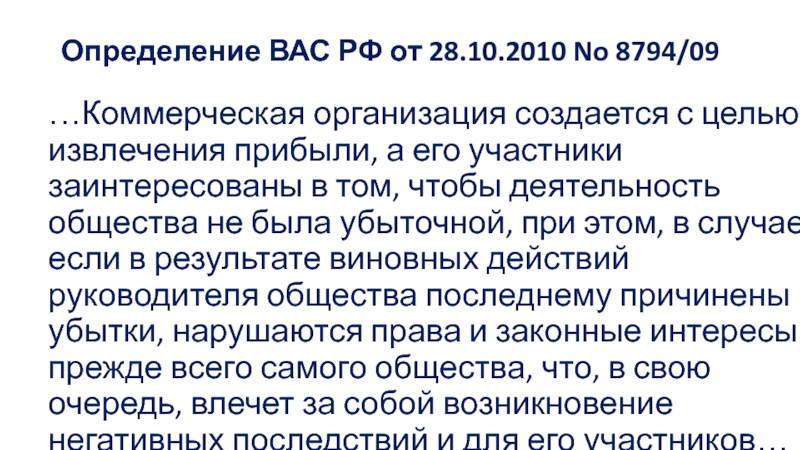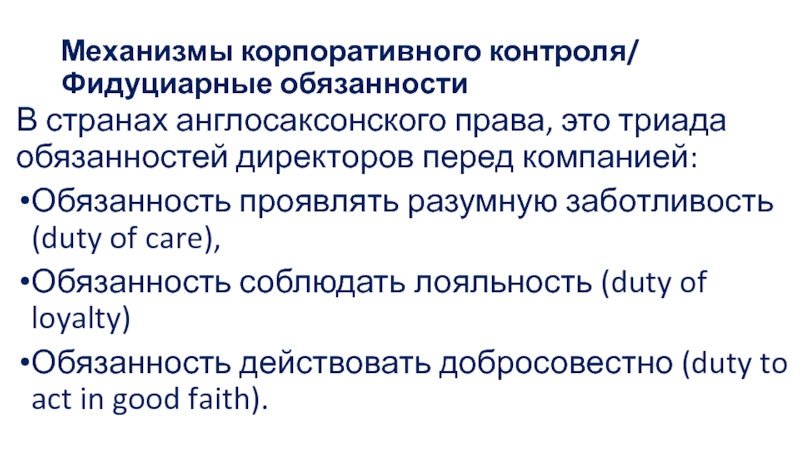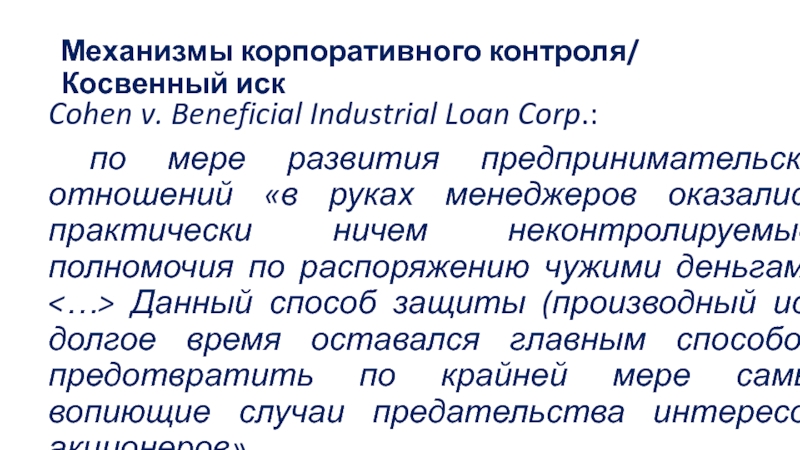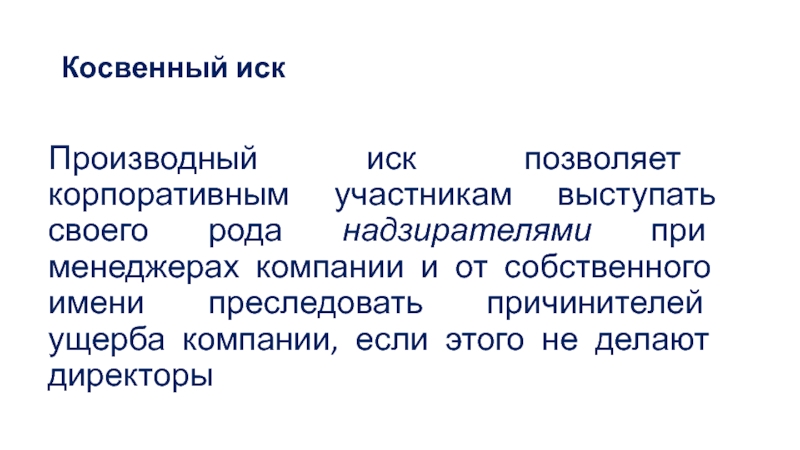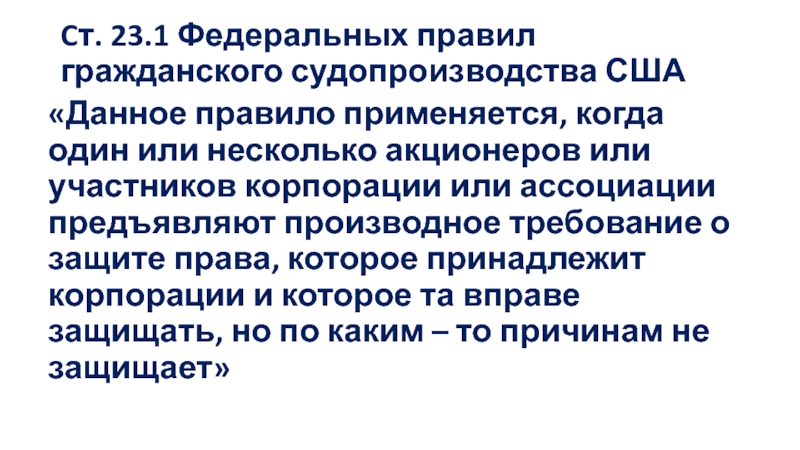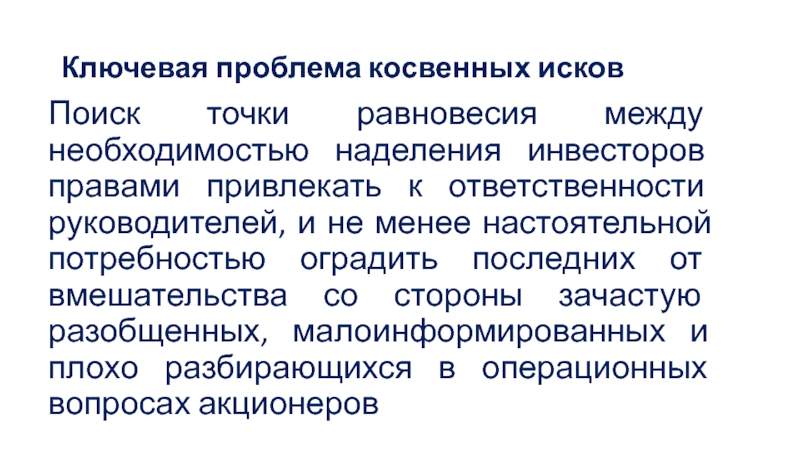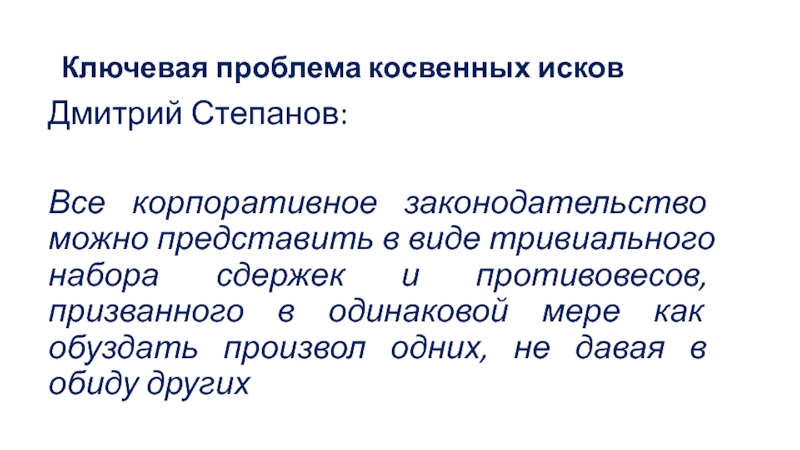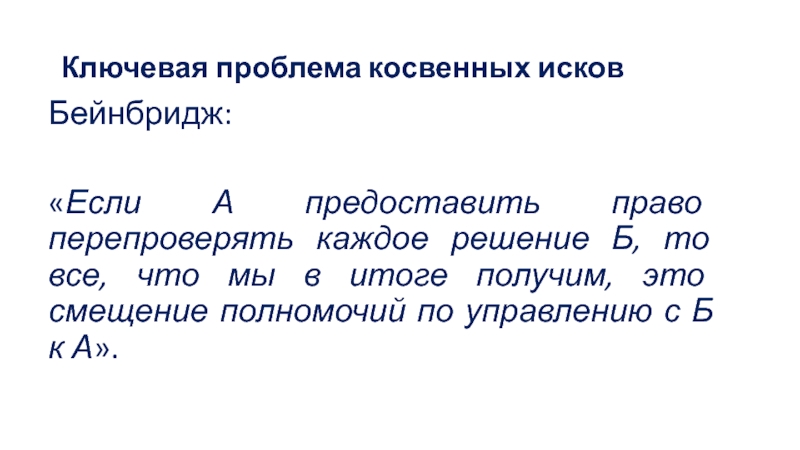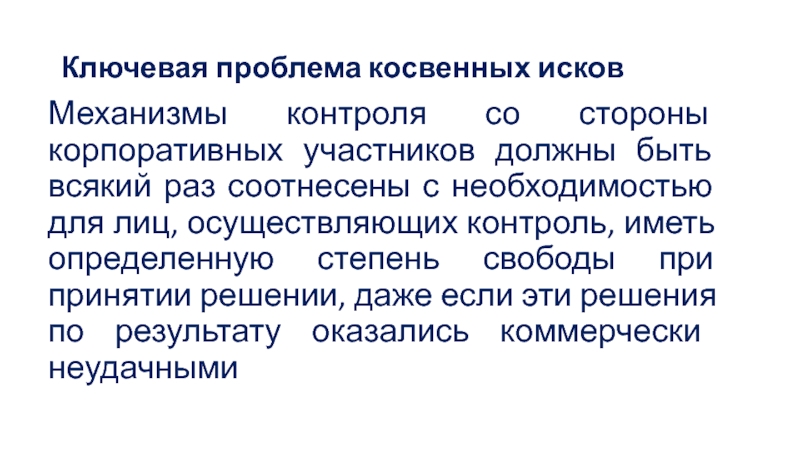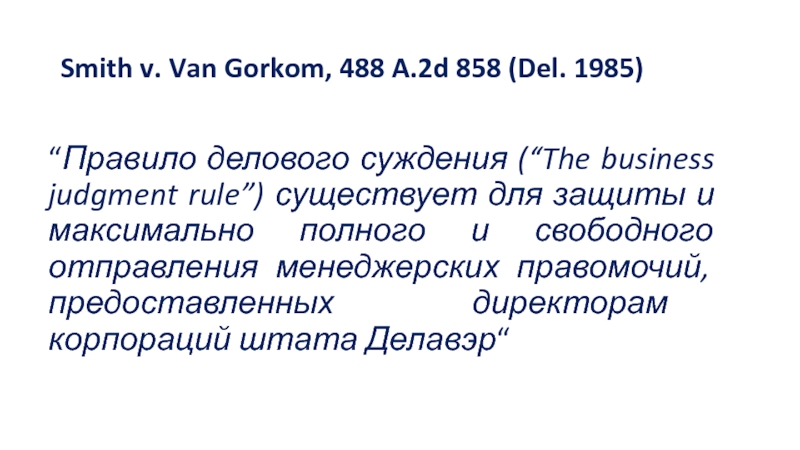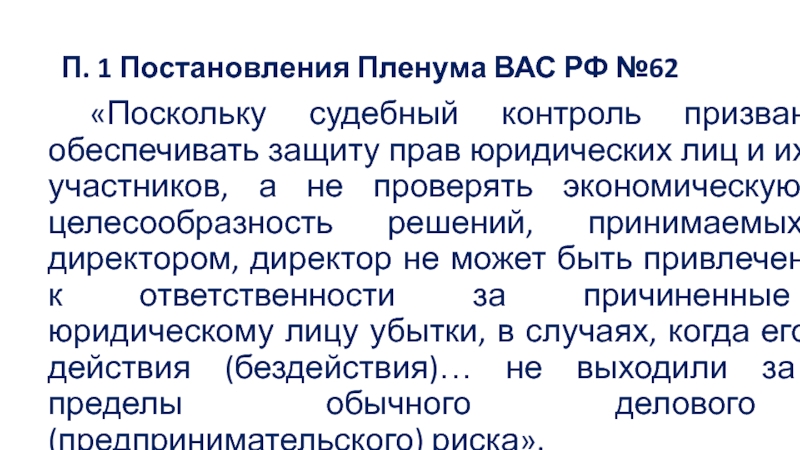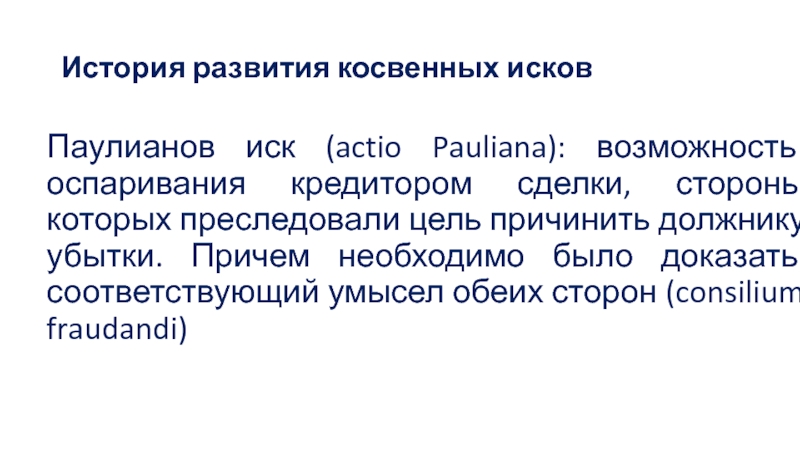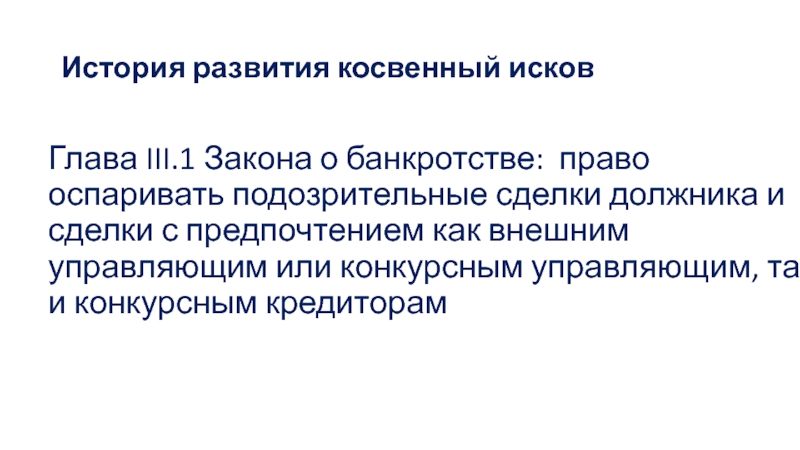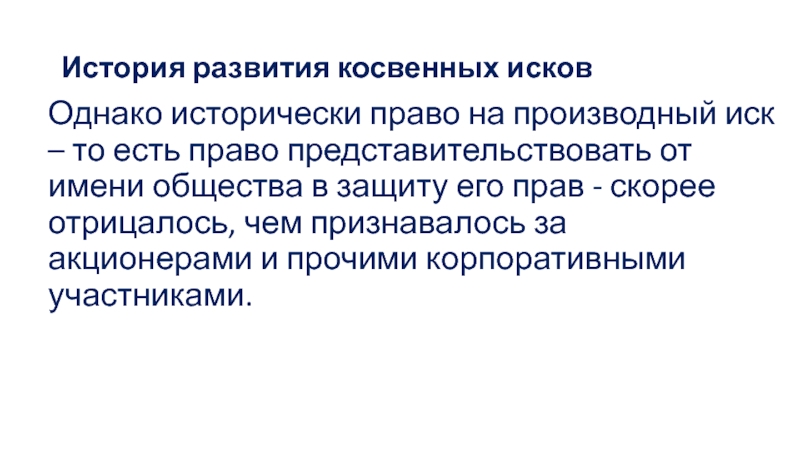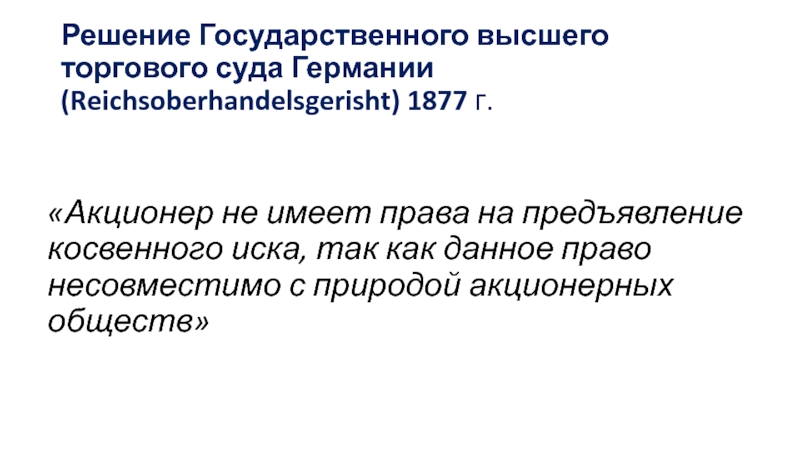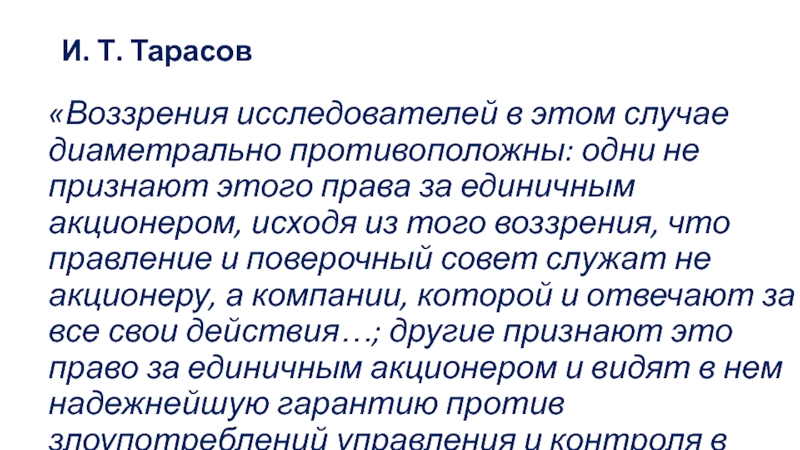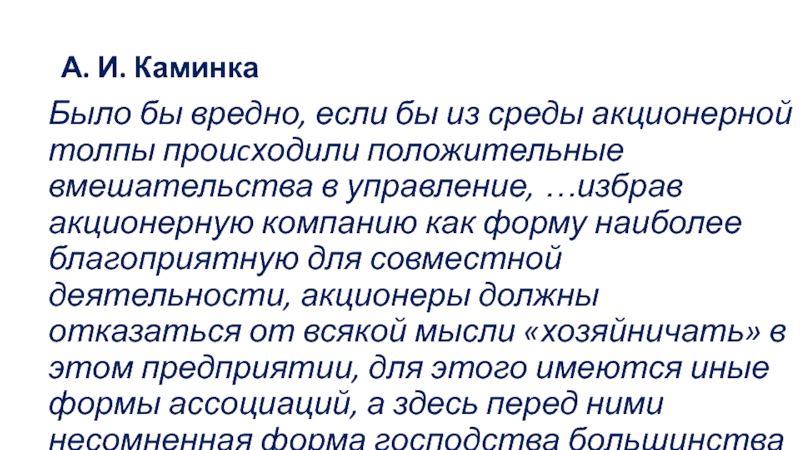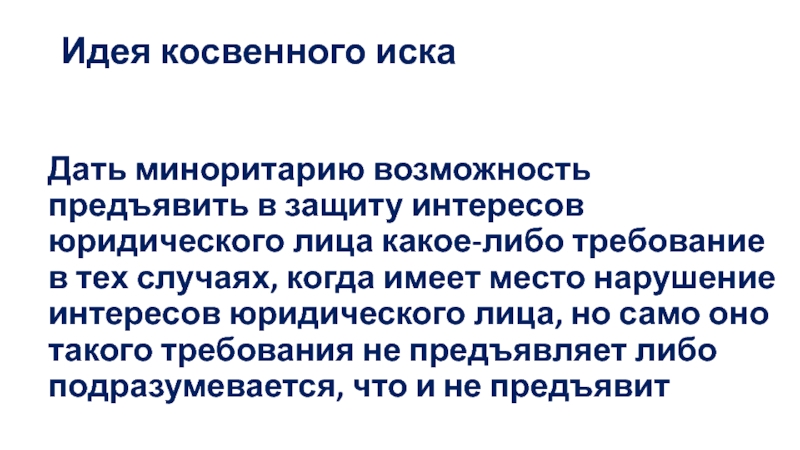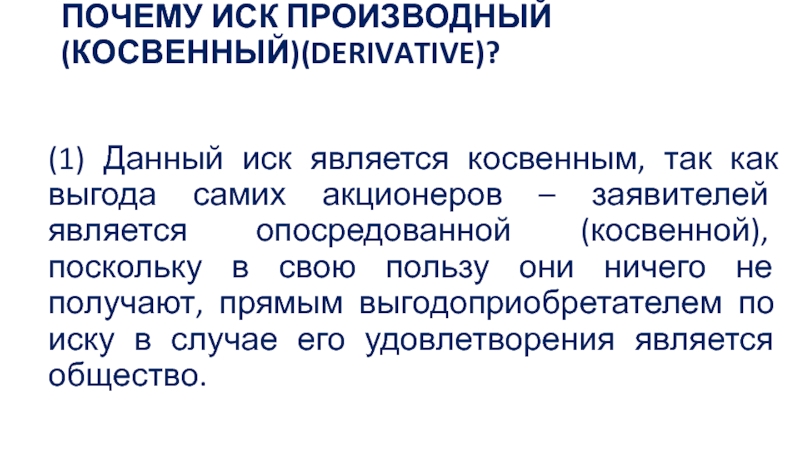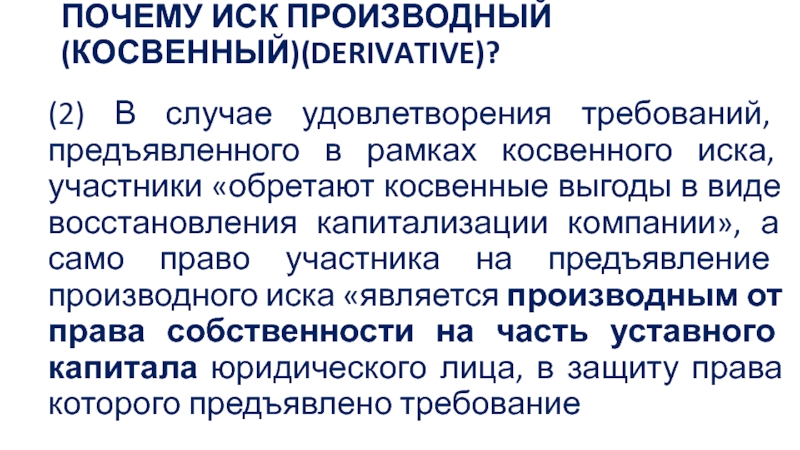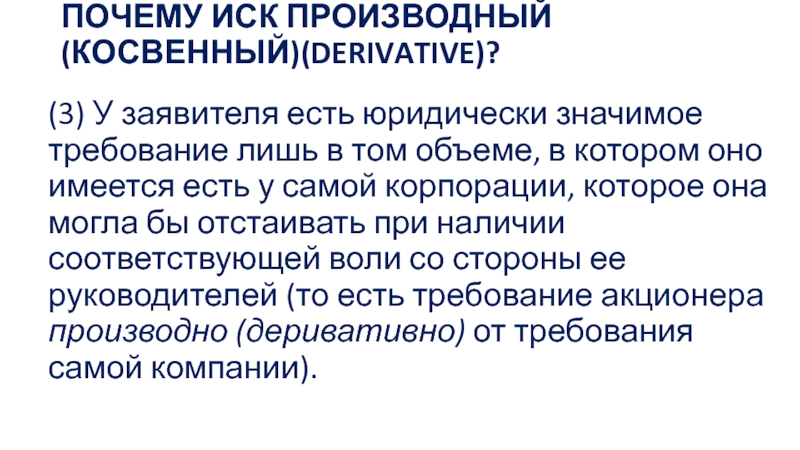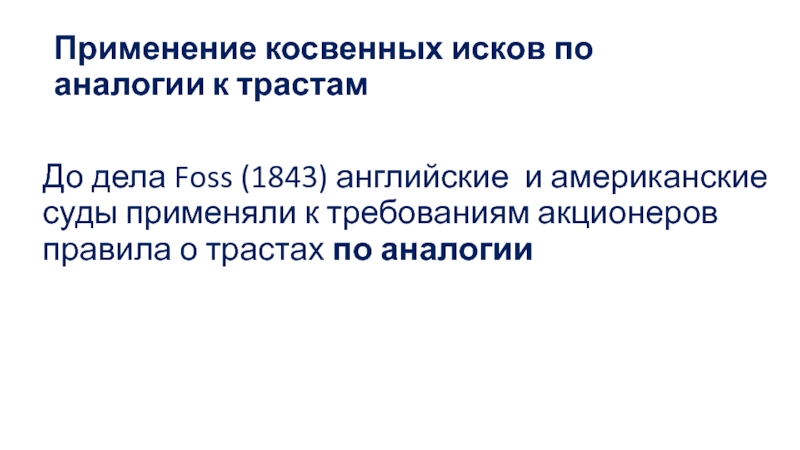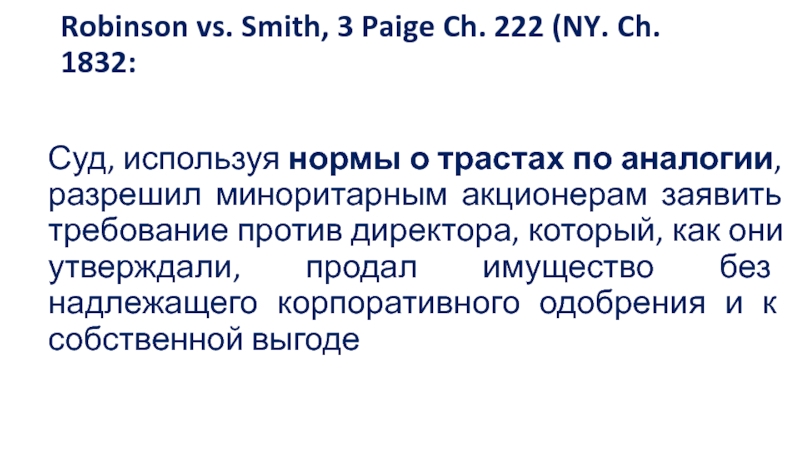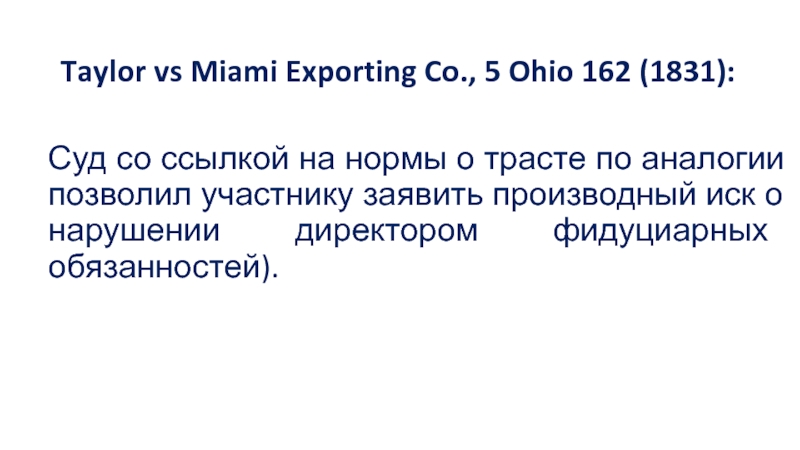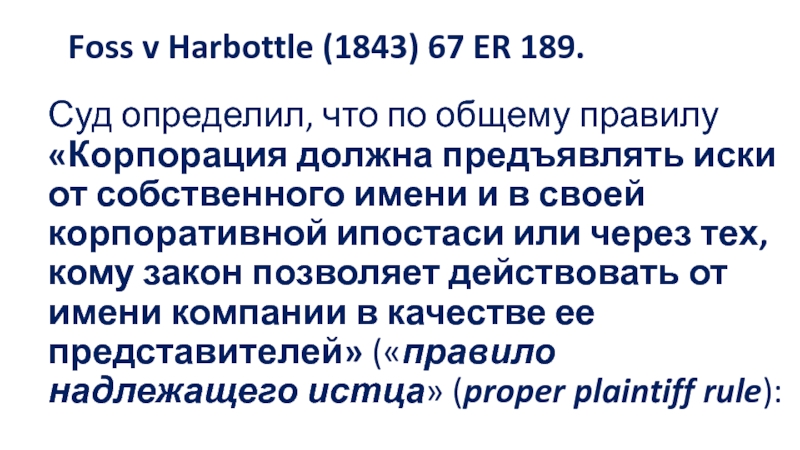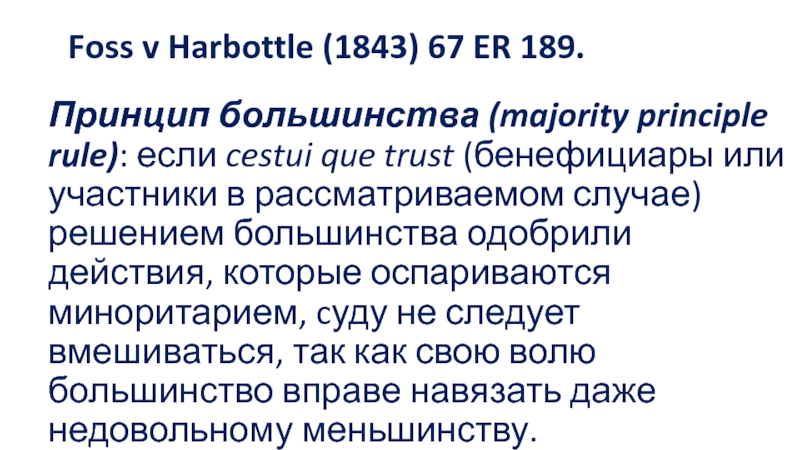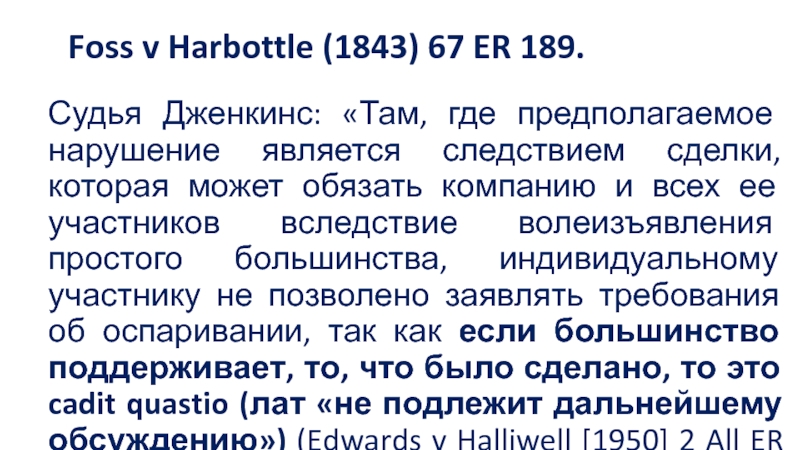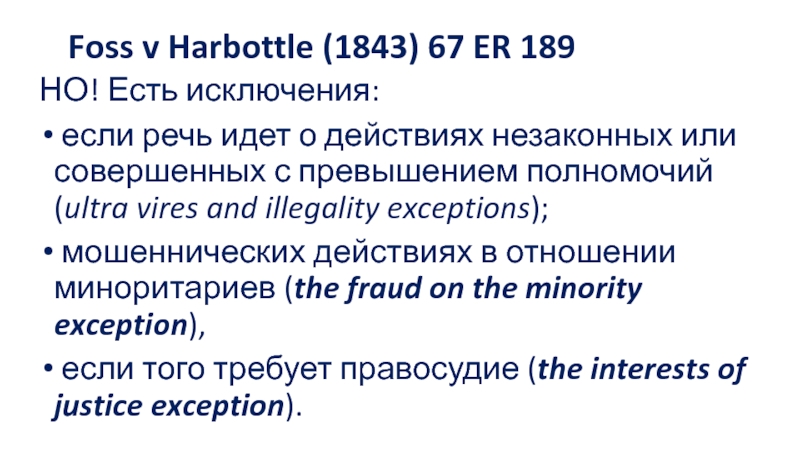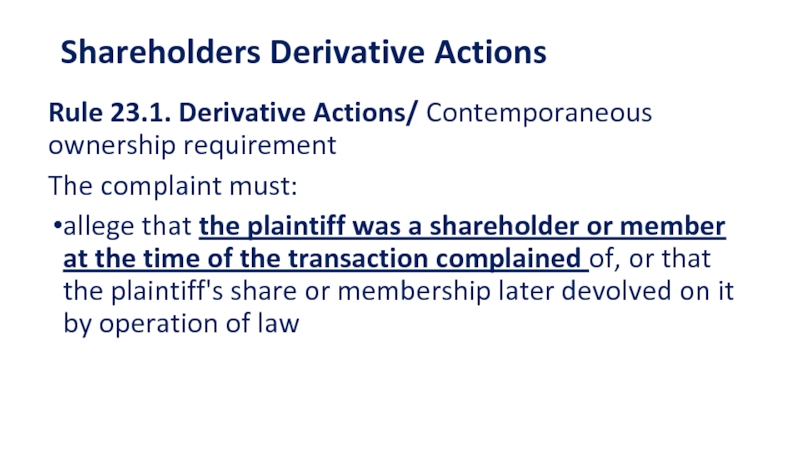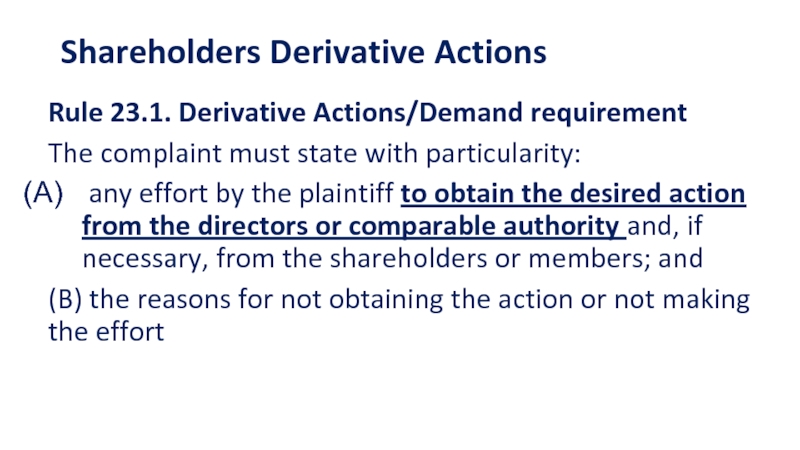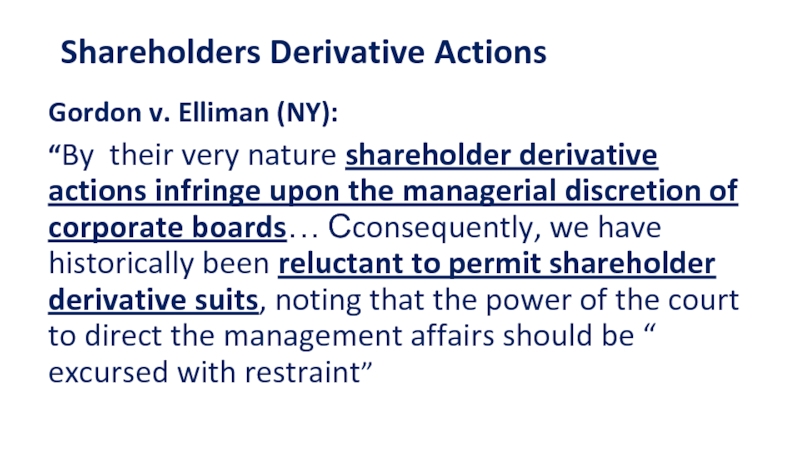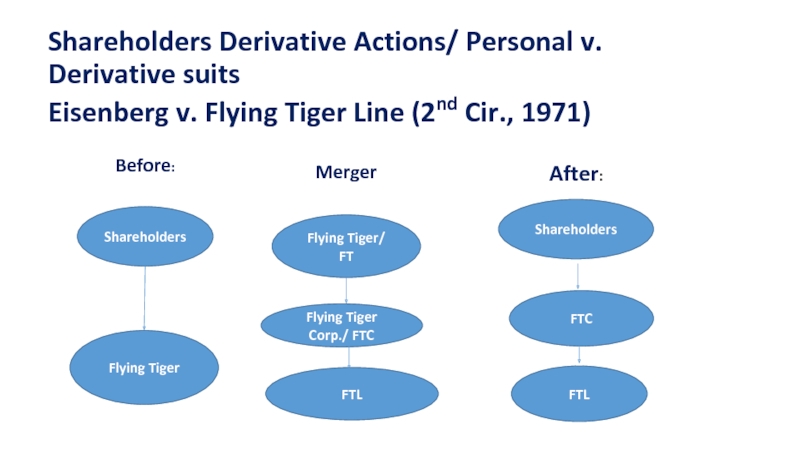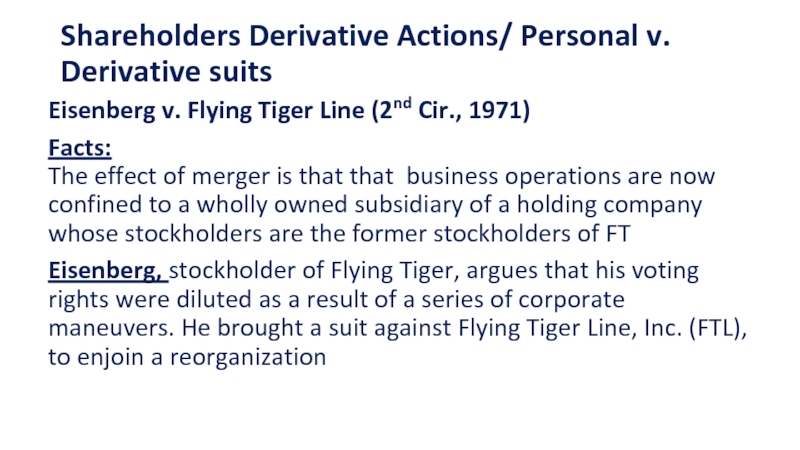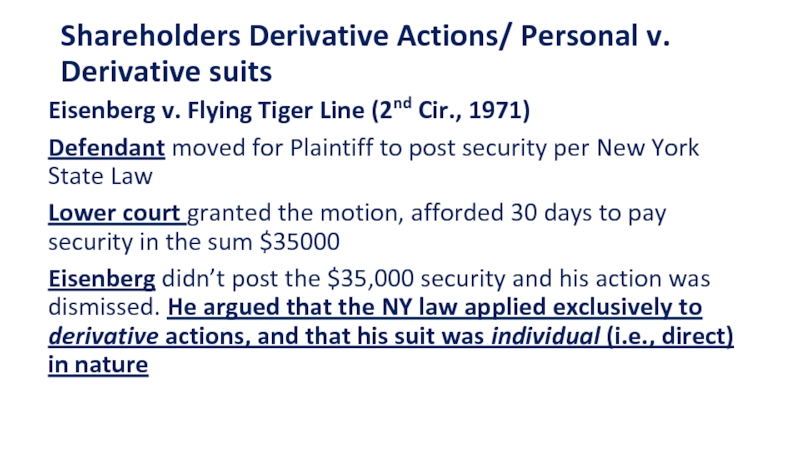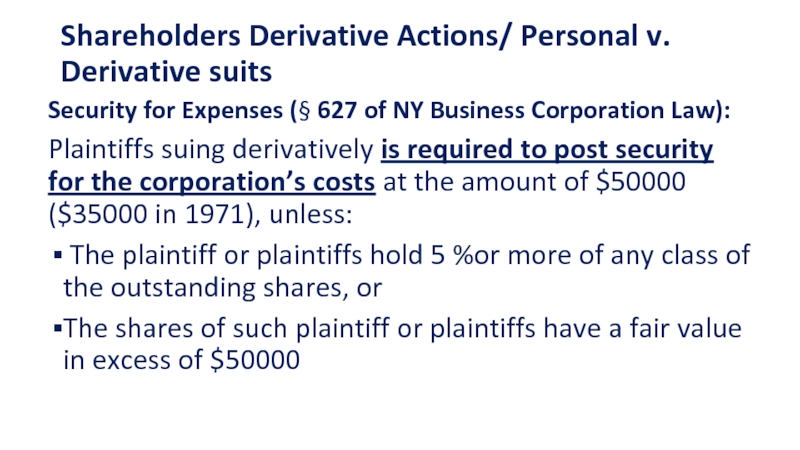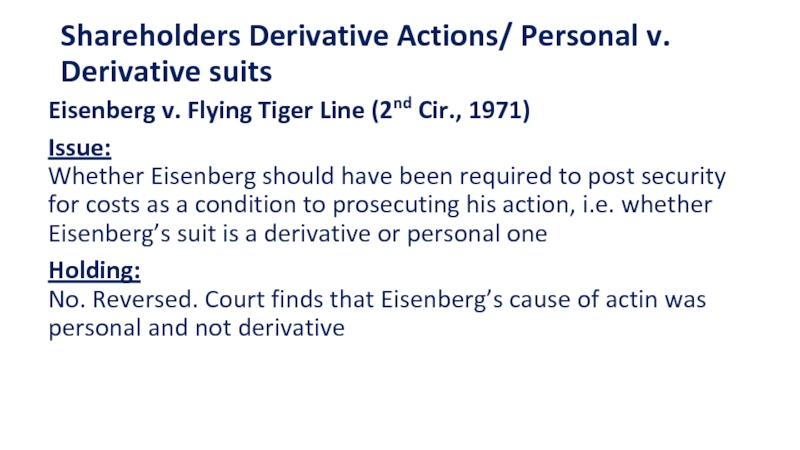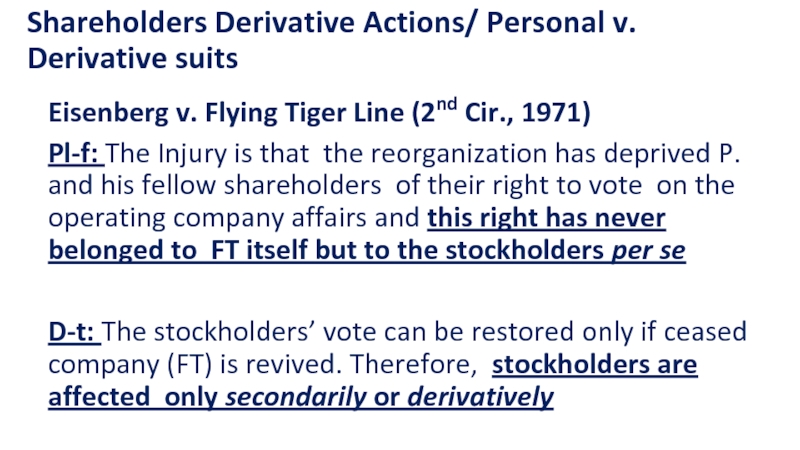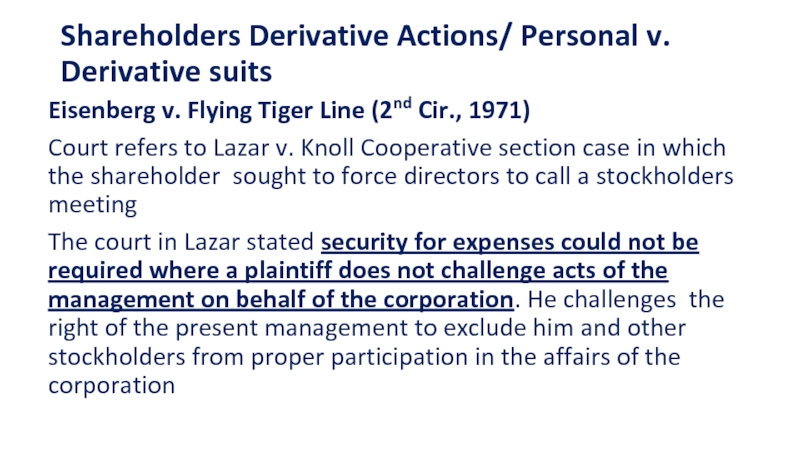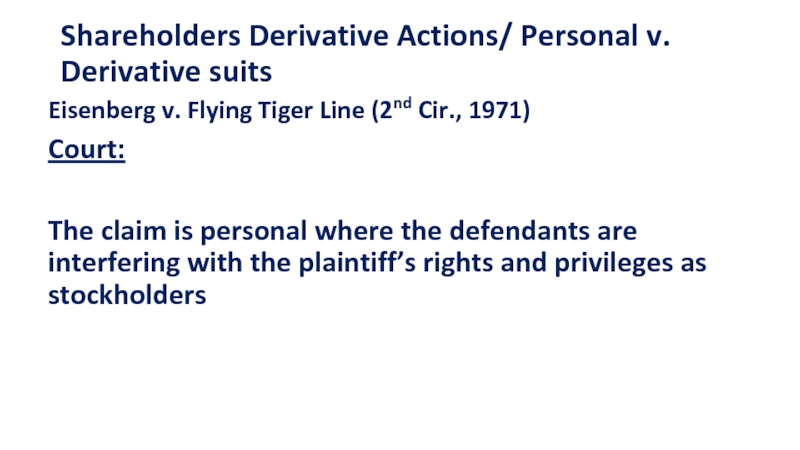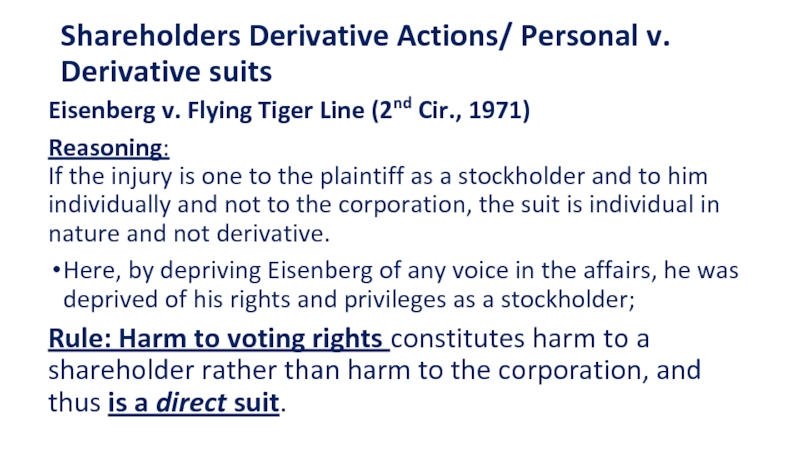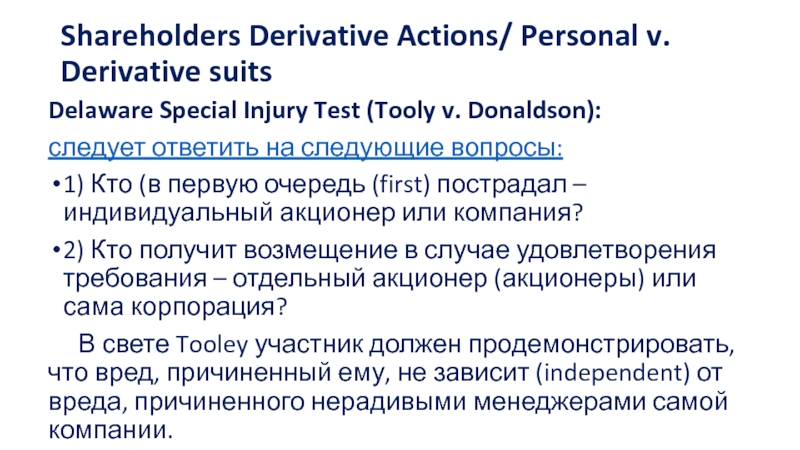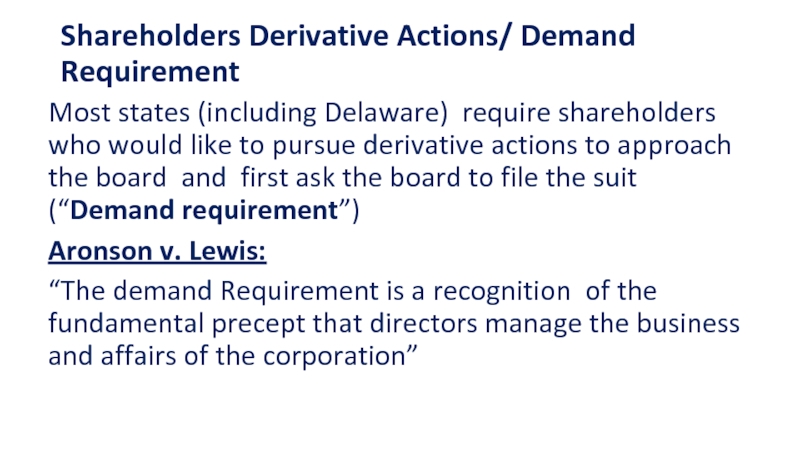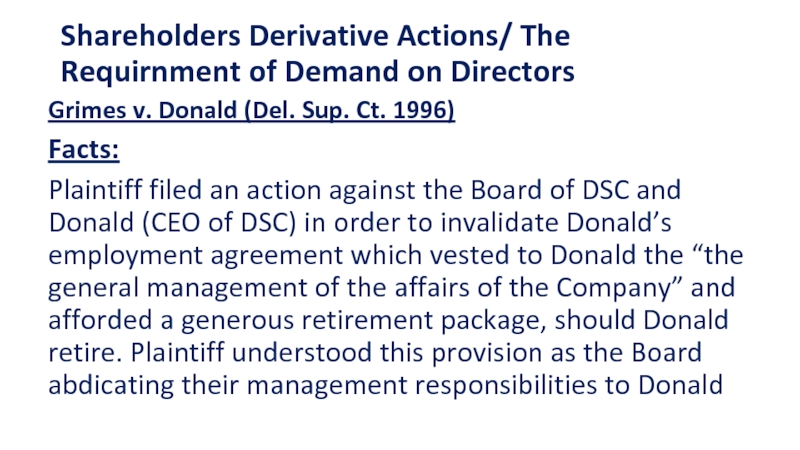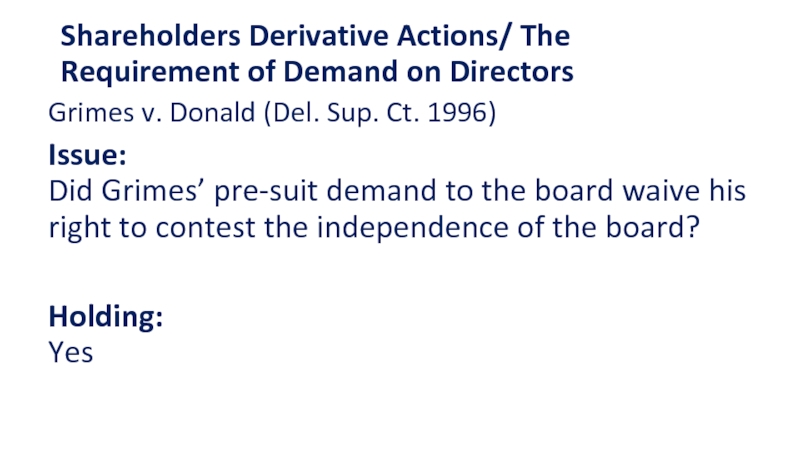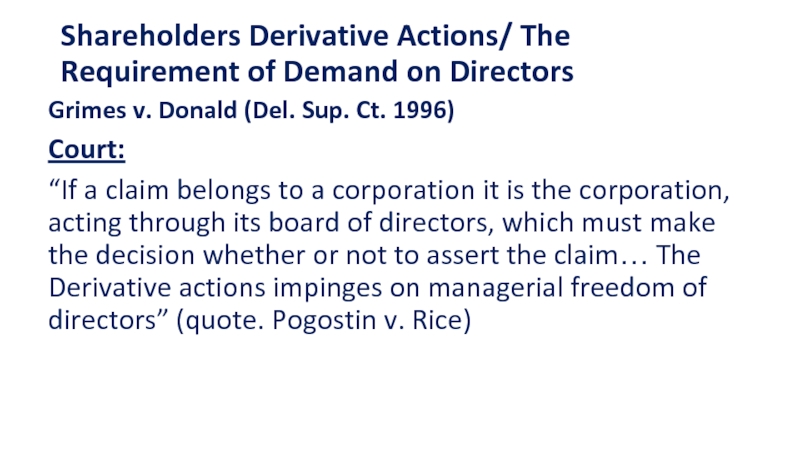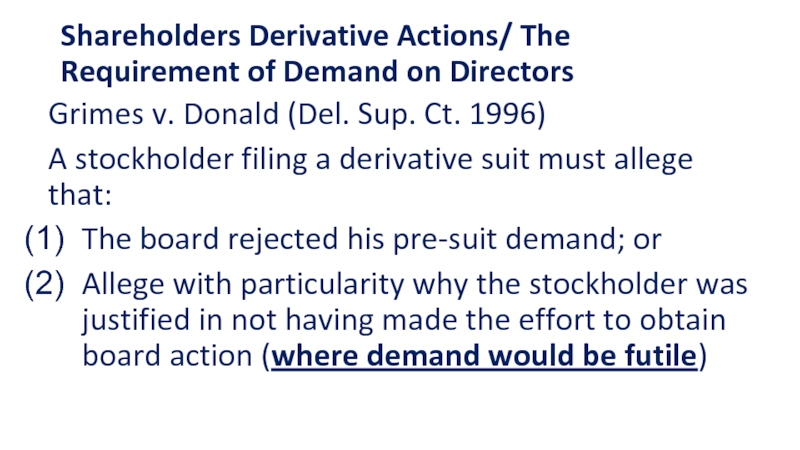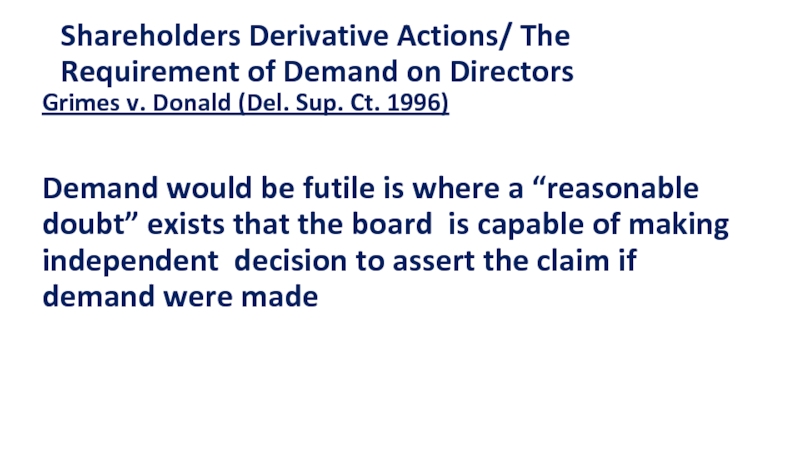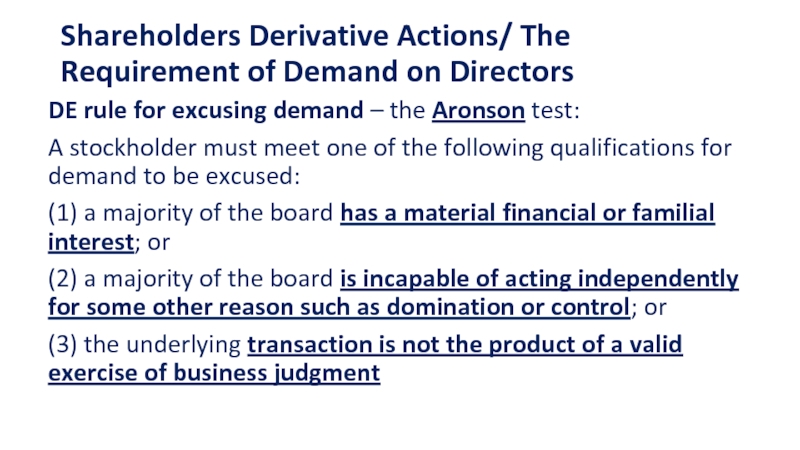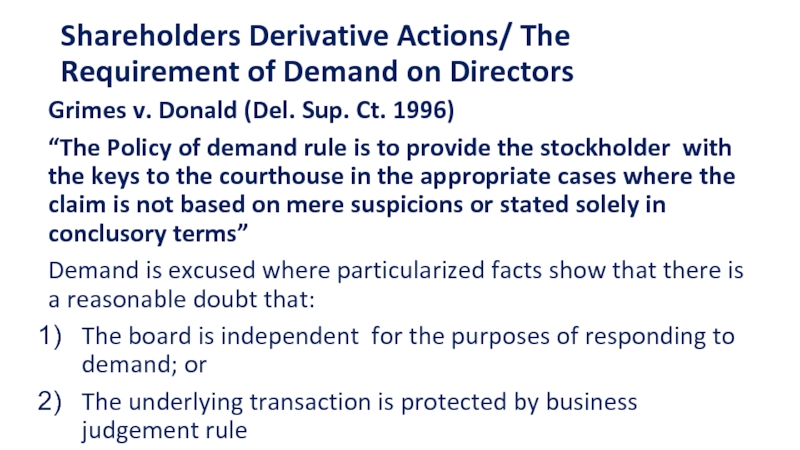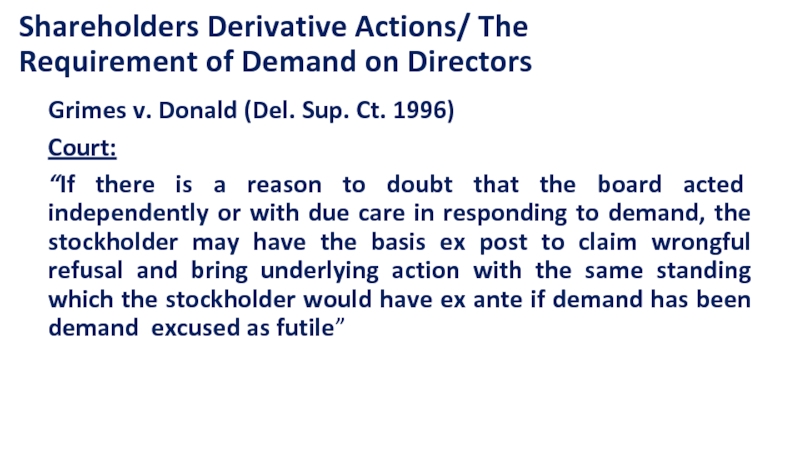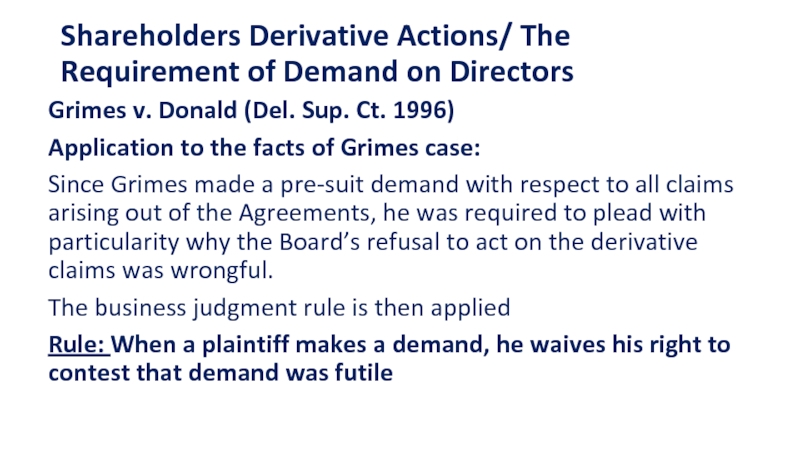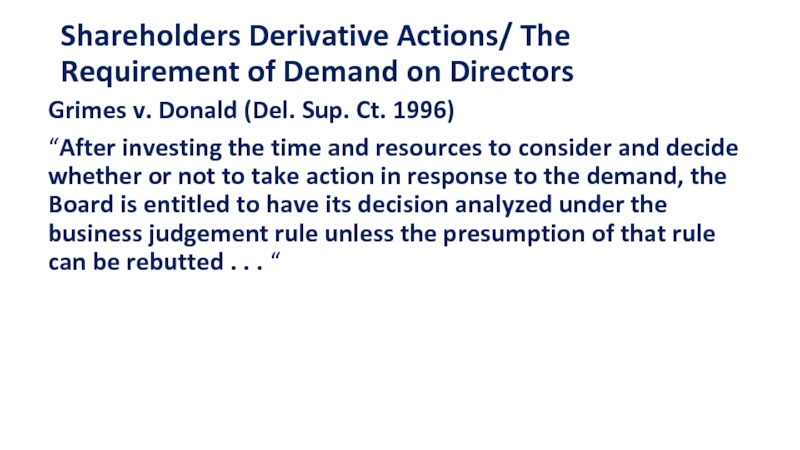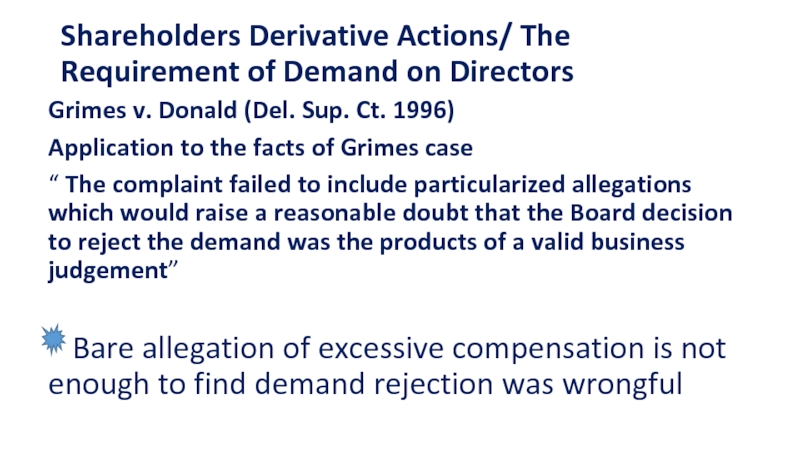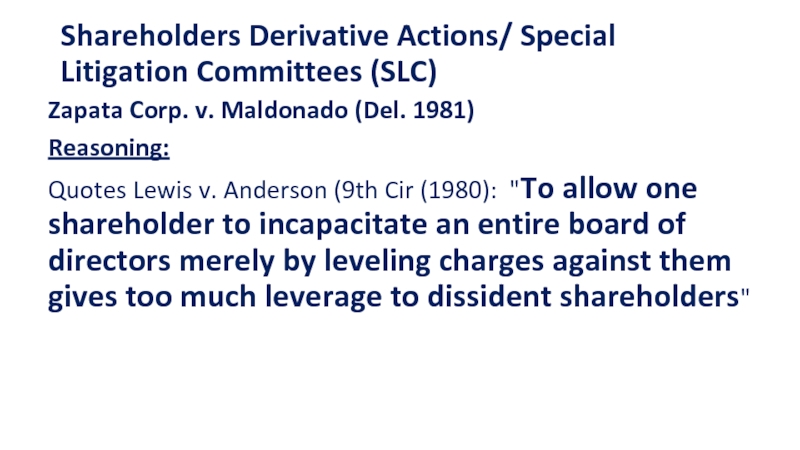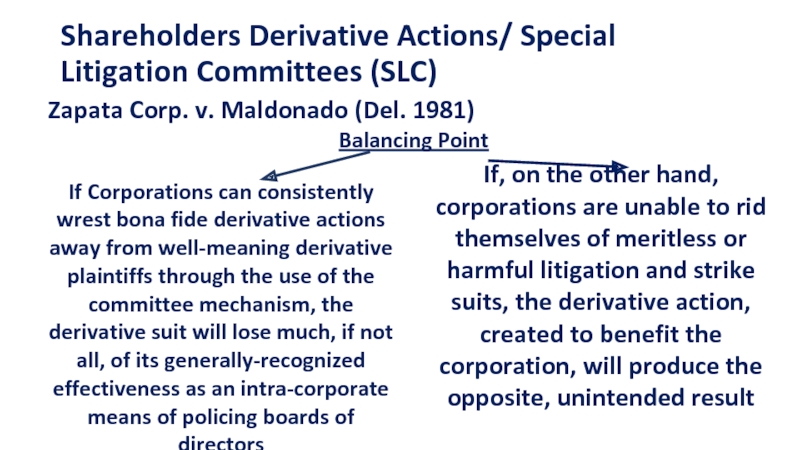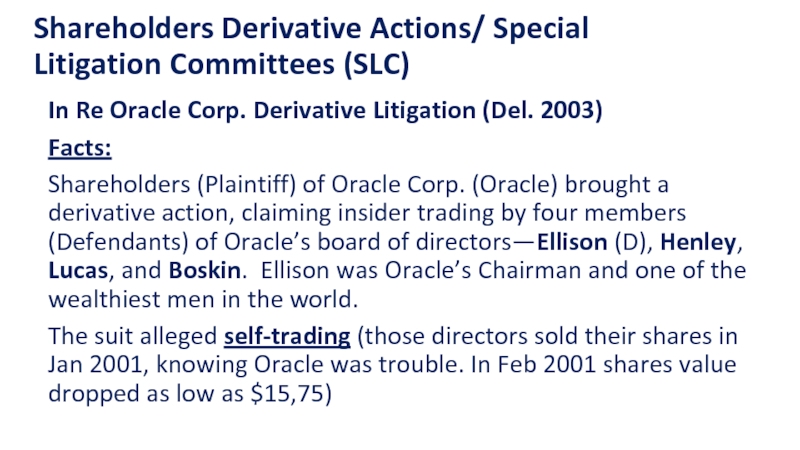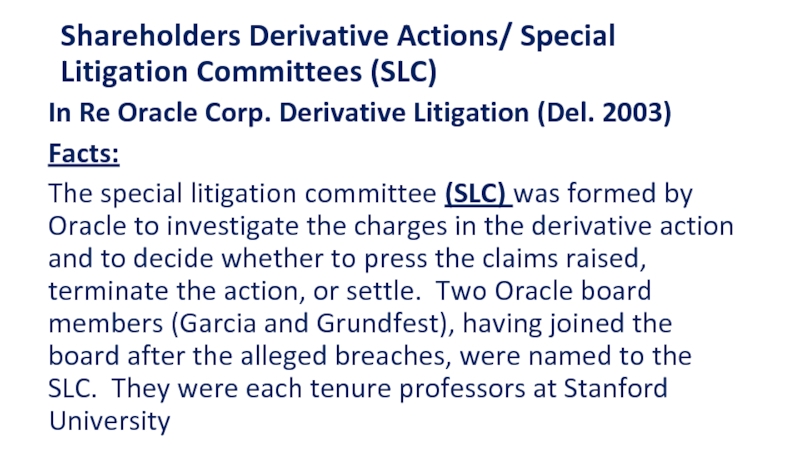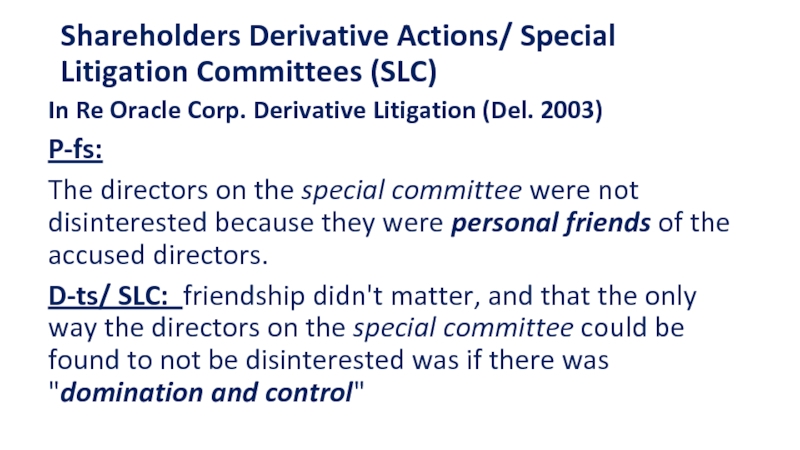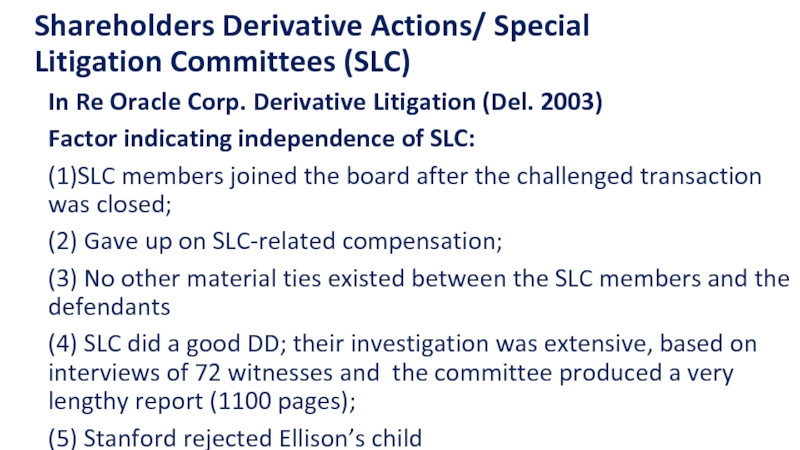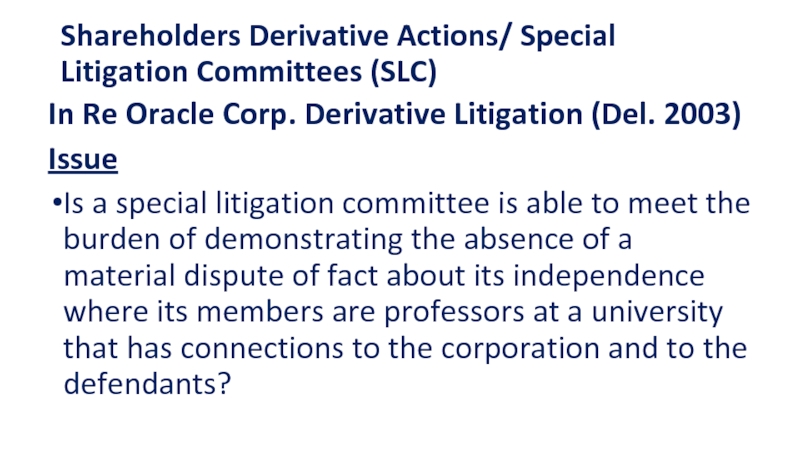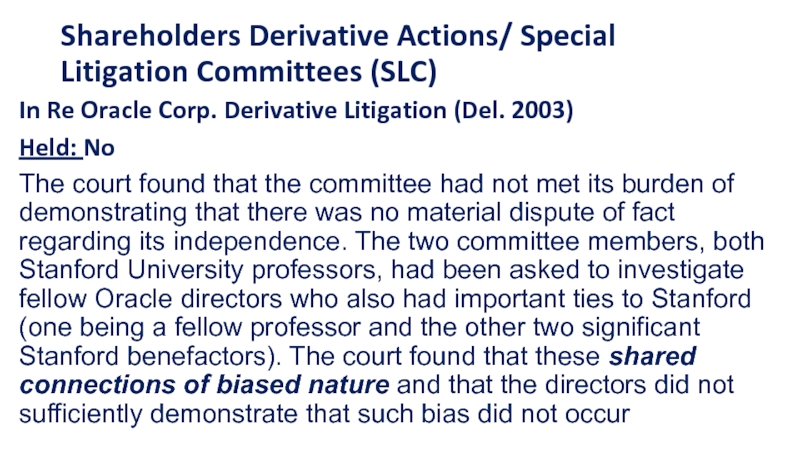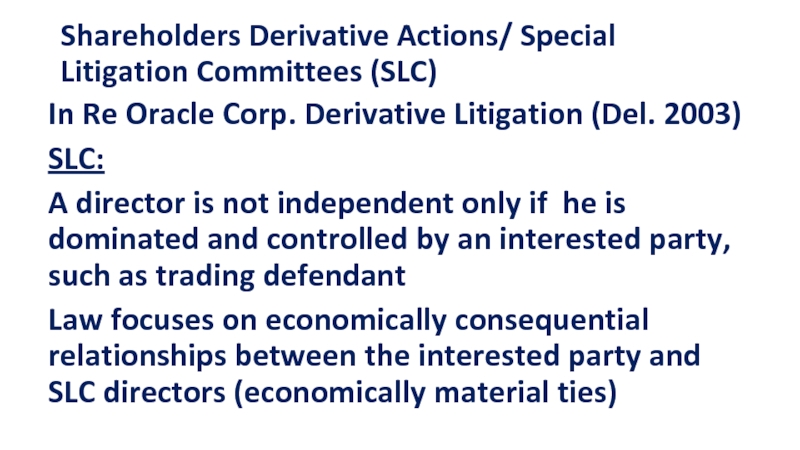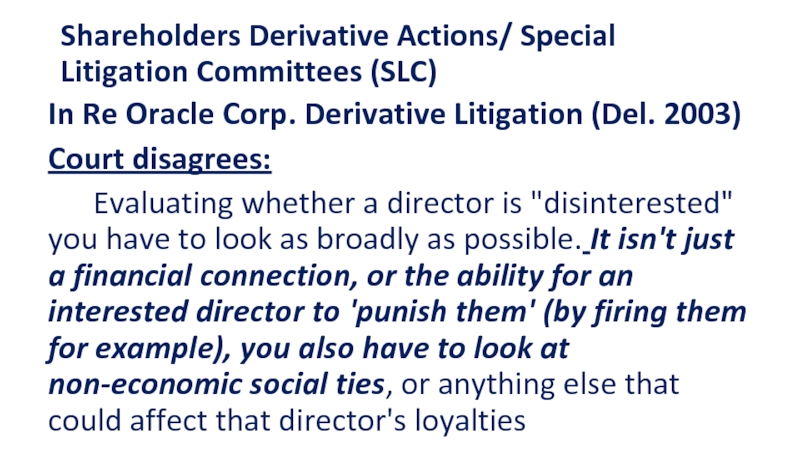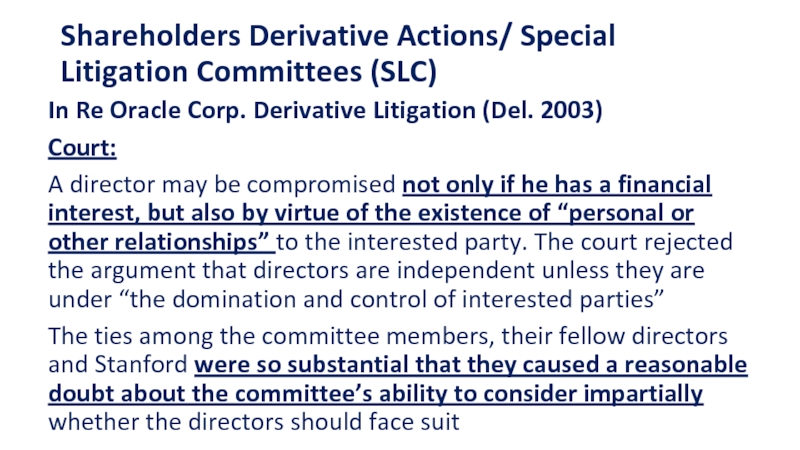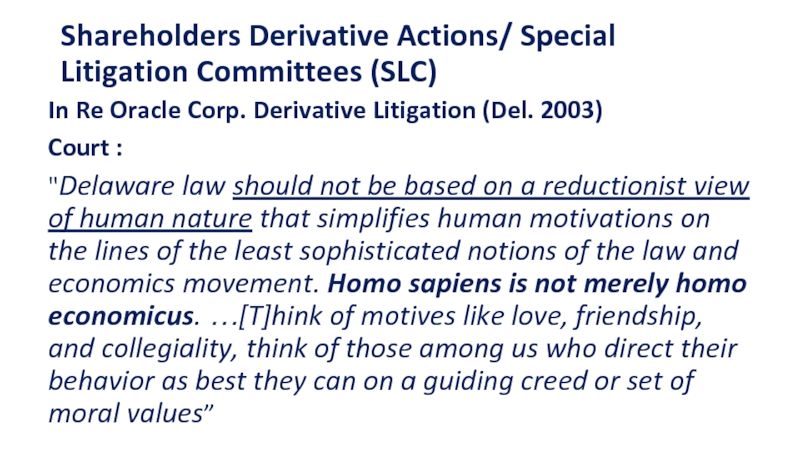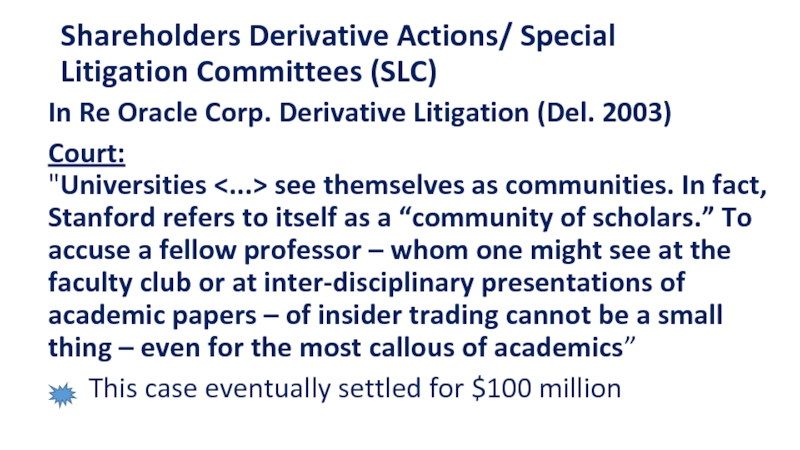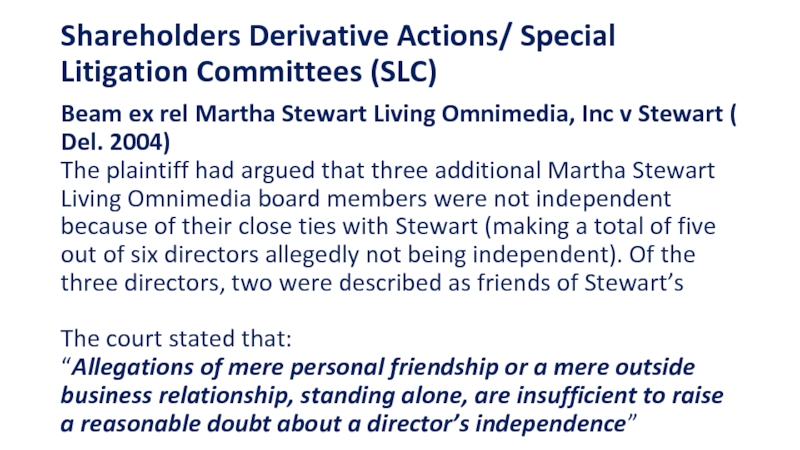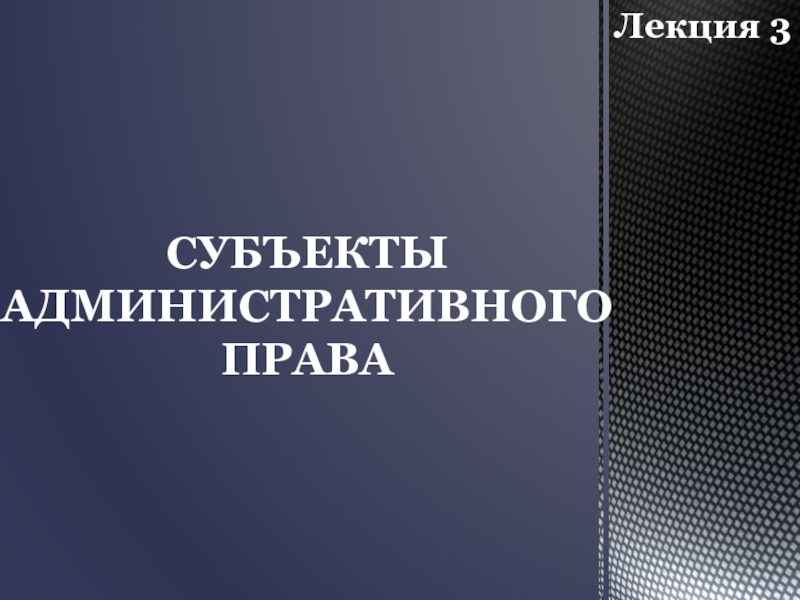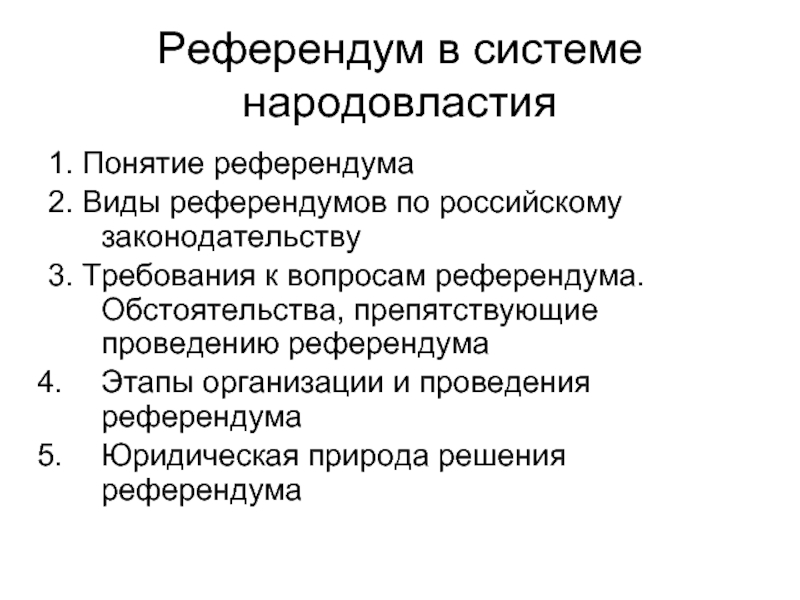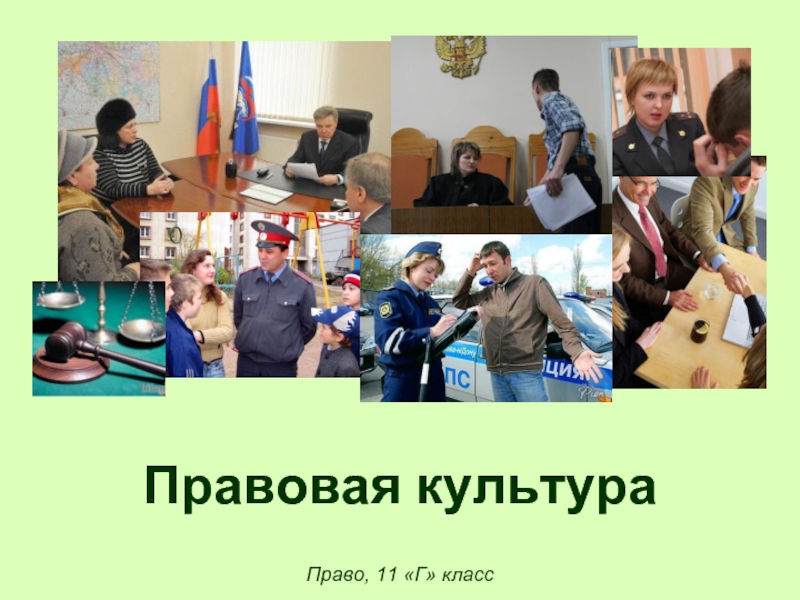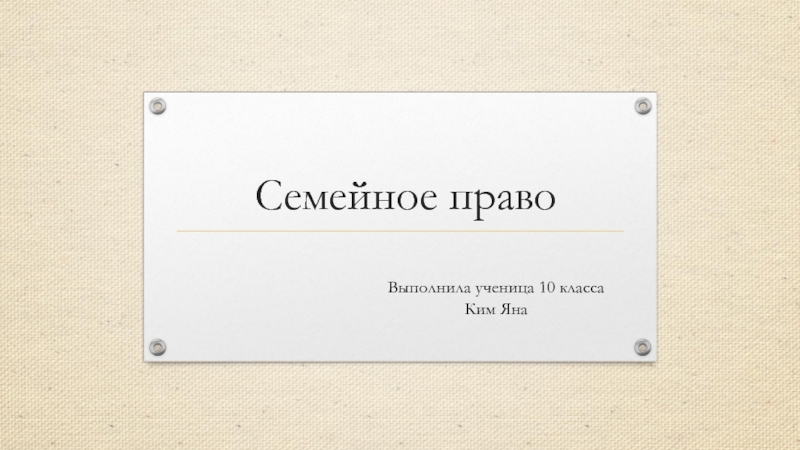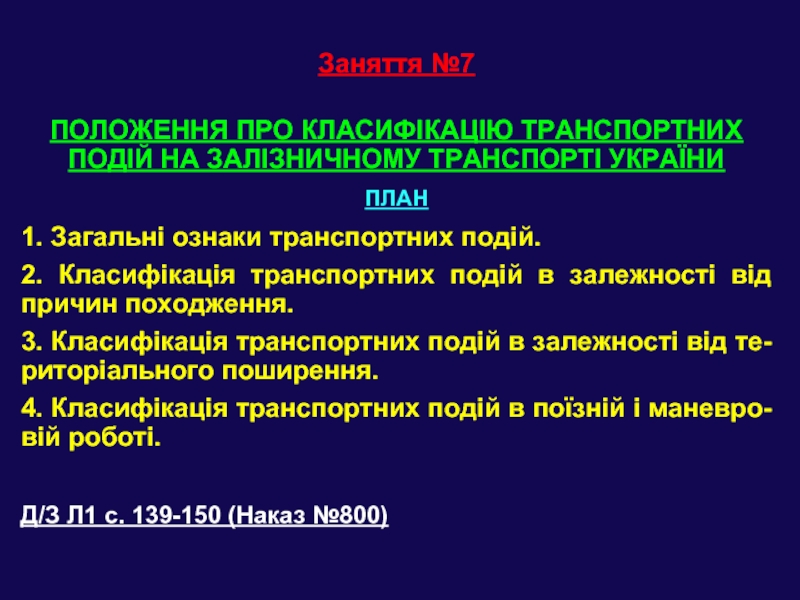- Главная
- Разное
- Дизайн
- Бизнес и предпринимательство
- Аналитика
- Образование
- Развлечения
- Красота и здоровье
- Финансы
- Государство
- Путешествия
- Спорт
- Недвижимость
- Армия
- Графика
- Культурология
- Еда и кулинария
- Лингвистика
- Английский язык
- Астрономия
- Алгебра
- Биология
- География
- Детские презентации
- Информатика
- История
- Литература
- Маркетинг
- Математика
- Медицина
- Менеджмент
- Музыка
- МХК
- Немецкий язык
- ОБЖ
- Обществознание
- Окружающий мир
- Педагогика
- Русский язык
- Технология
- Физика
- Философия
- Химия
- Шаблоны, картинки для презентаций
- Экология
- Экономика
- Юриспруденция
Косвенные иски презентация
Содержание
- 1. Косвенные иски
- 2. Производные иски ”Производный иск – это
- 3. Agency problem/ проблема агентских издержек Система
- 4. Производные иски Решение agency problem -
- 5. Dodge vs. Ford Motor Co.
- 6. пп.5 п.2 Постановления Пленума ВАС РФ от
- 7. Определение ВАС РФ от 28.10.2010 No 8794/09
- 8. Механизмы корпоративного контроля/ Фидуциарные обязанности В странах
- 9. Механизмы корпоративного контроля/ Косвенный иск Cohen v.
- 10. Косвенный иск Производный иск позволяет корпоративным
- 11. Cт. 23.1 Федеральных правил гражданского судопроизводства США
- 12. Ключевая проблема косвенных исков Поиск точки равновесия
- 13. Ключевая проблема косвенных исков Дмитрий Степанов:
- 14. Ключевая проблема косвенных исков Бейнбридж:
- 15. Ключевая проблема косвенных исков Механизмы контроля со
- 16. Smith v. Van Gorkom, 488 A.2d 858
- 17. П. 1 Постановления Пленума ВАС РФ №62
- 18. История развития косвенных исков Паулианов иск (actio
- 19. История развития косвенный исков Глава
- 20. История развития косвенных исков Однако исторически право
- 21. Решение Государственного высшего торгового суда Германии (Reichsoberhandelsgerisht)
- 22. И. Т. Тарасов «Воззрения исследователей
- 23. И. Т. Тарасов (склоняясь к первой позиции):
- 24. А. И. Каминка Было бы вредно, если
- 25. Идея косвенного иска Дать
- 26. ПОЧЕМУ ИСК ПРОИЗВОДНЫЙ (КОСВЕННЫЙ)(DERIVATIVE)?
- 27. ПОЧЕМУ ИСК ПРОИЗВОДНЫЙ (КОСВЕННЫЙ)(DERIVATIVE)? (2)
- 28. ПОЧЕМУ ИСК ПРОИЗВОДНЫЙ (КОСВЕННЫЙ)(DERIVATIVE)? (3)
- 29. Применение косвенных исков по аналогии
- 30. Robinson vs. Smith, 3 Paige Ch.
- 31. Taylor vs Miami Exporting
- 32. Foss v Harbottle (1843) 67
- 33. Foss v Harbottle (1843) 67
- 34. Foss v Harbottle (1843) 67
- 35. Foss v Harbottle (1843) 67
- 36. Foss v Harbottle (1843) 67
- 37. Shareholders Derivative Actions Rule 23.1. Derivative
- 38. Shareholders Derivative Actions Rule 23.1. Derivative
- 39. Shareholders Derivative Actions Gordon v. Elliman
- 40. Shareholders Derivative Actions/ Personal v. Derivative suits
- 41. Shareholders Derivative Actions/ Personal v. Derivative suits
- 42. Shareholders Derivative Actions/ Personal v. Derivative suits
- 43. Shareholders Derivative Actions/ Personal v. Derivative suits
- 44. Shareholders Derivative Actions/ Personal v. Derivative suits
- 45. Shareholders Derivative Actions/ Personal v. Derivative suits
- 46. Shareholders Derivative Actions/ Personal v. Derivative suits
- 47. Shareholders Derivative Actions/ Personal v. Derivative suits
- 48. Shareholders Derivative Actions/ Personal v. Derivative suits
- 49. Shareholders Derivative Actions/ Personal v. Derivative suits
- 50. Shareholders Derivative Actions/ Demand Requirement Most
- 51. Shareholders Derivative Actions/ The Requirnment of Demand
- 52. Shareholders Derivative Actions/ The Requirnment of Demand
- 53. Shareholders Derivative Actions/ The Requirement of Demand
- 54. Shareholders Derivative Actions/ The Requirement of Demand
- 55. Shareholders Derivative Actions/ The Requirement of Demand
- 56. Shareholders Derivative Actions/ The Requirement of Demand
- 57. Shareholders Derivative Actions/ The Requirement of Demand
- 58. Shareholders Derivative Actions/ The Requirement of Demand
- 59. Shareholders Derivative Actions/ The Requirement of Demand
- 60. Shareholders Derivative Actions/ The Requirement of Demand
- 61. Shareholders Derivative Actions/ The Requirement of Demand
- 62. Shareholders Derivative Actions/ The Requirement of Demand
- 63. Shareholders Derivative Actions/ Special Litigation Committees (SLC)
- 64. Shareholders Derivative Actions/ Special Litigation Committees (SLC)
- 65. Shareholders Derivative Actions/ Special Litigation Committees (SLC)
- 66. Shareholders Derivative Actions/ Special Litigation Committees (SLC)
- 67. Shareholders Derivative Actions/ Special Litigation Committees (SLC)
- 68. Shareholders Derivative Actions/ Special Litigation Committees (SLC)
- 69. Shareholders Derivative Actions/ Special Litigation Committees (SLC)
- 70. Shareholders Derivative Actions/ Special Litigation Committees (SLC)
- 71. Shareholders Derivative Actions/ Special Litigation Committees (SLC)
- 72. Shareholders Derivative Actions/ Special Litigation Committees (SLC)
- 73. Shareholders Derivative Actions/ Special Litigation Committees (SLC)
- 74. Shareholders Derivative Actions/ Special Litigation Committees (SLC)
- 75. Shareholders Derivative Actions/ Special Litigation Committees (SLC)
- 76. Shareholders Derivative Actions/ Special Litigation Committees (SLC)
Слайд 2Производные иски
”Производный иск – это дитя неспокойного брака акционеров и менеджмента,
R. Ferrara (Shareholders Derivative Litigation)
Слайд 3Agency problem/ проблема агентских издержек
Система корпоративного управления во всем мире с
Слайд 4Производные иски
Решение agency problem - выработка таких механизмов eх post контроля,
Слайд 5Dodge vs. Ford Motor Co.
Хозяйственная корпорация создается и служит первоочередно
Слайд 6пп.5 п.2 Постановления Пленума ВАС РФ от 30.07.2013 N 62
«При
Слайд 7Определение ВАС РФ от 28.10.2010 No 8794/09
…Коммерческая организация создается с
Слайд 8Механизмы корпоративного контроля/ Фидуциарные обязанности
В странах англосаксонского права, это триада обязанностей
Обязанность проявлять разумную заботливость (duty of care),
Обязанность соблюдать лояльность (duty of loyalty)
Обязанность действовать добросовестно (duty to act in good faith).
Слайд 9Механизмы корпоративного контроля/ Косвенный иск
Cohen v. Beneficial Industrial Loan Corp.:
по
Слайд 10Косвенный иск
Производный иск позволяет корпоративным участникам выступать своего рода надзирателями при
Слайд 11Cт. 23.1 Федеральных правил гражданского судопроизводства США
«Данное правило применяется, когда
Слайд 12Ключевая проблема косвенных исков
Поиск точки равновесия между необходимостью наделения инвесторов правами
Слайд 13Ключевая проблема косвенных исков
Дмитрий Степанов:
Все корпоративное законодательство можно представить в
Слайд 14Ключевая проблема косвенных исков
Бейнбридж:
«Если А предоставить право перепроверять каждое решение
Слайд 15Ключевая проблема косвенных исков
Механизмы контроля со стороны корпоративных участников должны быть
Слайд 16Smith v. Van Gorkom, 488 A.2d 858 (Del. 1985)
“Правило делового суждения
Слайд 17П. 1 Постановления Пленума ВАС РФ №62
«Поскольку судебный контроль призван
Слайд 18История развития косвенных исков
Паулианов иск (actio Pauliana): возможность оспаривания кредитором сделки,
Слайд 19История развития косвенный исков
Глава III.1 Закона о банкротстве: право оспаривать
Слайд 20История развития косвенных исков
Однако исторически право на производный иск – то
Слайд 21Решение Государственного высшего торгового суда Германии (Reichsoberhandelsgerisht) 1877 г.
«Акционер не имеет
Слайд 22И. Т. Тарасов
«Воззрения исследователей в этом случае диаметрально противоположны: одни
Слайд 23И. Т. Тарасов (склоняясь к первой позиции):
«Между правлением и поверочным советом,
за единичным акционером не может быть признано право искать судом убытки;…за единичным акционером может быть признано только право жалобы или протеста общему собранию».
Слайд 24А. И. Каминка
Было бы вредно, если бы из среды акционерной толпы
Слайд 25Идея косвенного иска
Дать миноритарию возможность предъявить в защиту интересов юридического
Слайд 26ПОЧЕМУ ИСК ПРОИЗВОДНЫЙ (КОСВЕННЫЙ)(DERIVATIVE)?
(1) Данный иск является косвенным, так как выгода
Слайд 27ПОЧЕМУ ИСК ПРОИЗВОДНЫЙ (КОСВЕННЫЙ)(DERIVATIVE)?
(2) В случае удовлетворения требований, предъявленного в рамках
Слайд 28ПОЧЕМУ ИСК ПРОИЗВОДНЫЙ (КОСВЕННЫЙ)(DERIVATIVE)?
(3) У заявителя есть юридически значимое требование лишь
Слайд 29
Применение косвенных исков по аналогии к трастам
До дела Foss (1843)
Слайд 30
Robinson vs. Smith, 3 Paige Ch. 222 (NY. Ch. 1832:
Суд,
Слайд 31
Taylor vs Miami Exporting Co., 5 Ohio 162 (1831):
Суд со ссылкой
Слайд 32
Foss v Harbottle (1843) 67 ER 189.
В данном деле
Слайд 33
Foss v Harbottle (1843) 67 ER 189.
Суд определил, что
Слайд 34
Foss v Harbottle (1843) 67 ER 189.
Принцип большинства (majority
Слайд 35
Foss v Harbottle (1843) 67 ER 189.
Судья Дженкинс: «Там,
Слайд 36
Foss v Harbottle (1843) 67 ER 189
НО! Есть исключения:
мошеннических действиях в отношении миноритариев (the fraud on the minority exception),
если того требует правосудие (the interests of justice exception).
Слайд 37Shareholders Derivative Actions
Rule 23.1. Derivative Actions/ Contemporaneous ownership requirement
The complaint
allege that the plaintiff was a shareholder or member at the time of the transaction complained of, or that the plaintiff's share or membership later devolved on it by operation of law
Слайд 38Shareholders Derivative Actions
Rule 23.1. Derivative Actions/Demand requirement
The complaint must state with
any effort by the plaintiff to obtain the desired action from the directors or comparable authority and, if necessary, from the shareholders or members; and
(B) the reasons for not obtaining the action or not making the effort
Слайд 39Shareholders Derivative Actions
Gordon v. Elliman (NY):
“By their very nature shareholder derivative
Слайд 40Shareholders Derivative Actions/ Personal v. Derivative suits
Eisenberg v. Flying Tiger Line
Flying Tiger
Shareholders
Flying Tiger/ FT
Before:
Merger
After:
Flying Tiger Corp./ FTC
FTL
Shareholders
FTC
FTL
Слайд 41Shareholders Derivative Actions/ Personal v. Derivative suits
Eisenberg v. Flying Tiger Line
Facts: The effect of merger is that that business operations are now confined to a wholly owned subsidiary of a holding company whose stockholders are the former stockholders of FT
Eisenberg, stockholder of Flying Tiger, argues that his voting rights were diluted as a result of a series of corporate maneuvers. He brought a suit against Flying Tiger Line, Inc. (FTL), to enjoin a reorganization
Слайд 42Shareholders Derivative Actions/ Personal v. Derivative suits
Eisenberg v. Flying Tiger Line
Defendant moved for Plaintiff to post security per New York State Law
Lower court granted the motion, afforded 30 days to pay security in the sum $35000
Eisenberg didn’t post the $35,000 security and his action was dismissed. He argued that the NY law applied exclusively to derivative actions, and that his suit was individual (i.e., direct) in nature
Слайд 43Shareholders Derivative Actions/ Personal v. Derivative suits
Security for Expenses (§ 627
Plaintiffs suing derivatively is required to post security for the corporation’s costs at the amount of $50000 ($35000 in 1971), unless:
The plaintiff or plaintiffs hold 5 %or more of any class of the outstanding shares, or
The shares of such plaintiff or plaintiffs have a fair value in excess of $50000
Слайд 44Shareholders Derivative Actions/ Personal v. Derivative suits
Eisenberg v. Flying Tiger Line
Issue: Whether Eisenberg should have been required to post security for costs as a condition to prosecuting his action, i.e. whether Eisenberg’s suit is a derivative or personal one
Holding: No. Reversed. Court finds that Eisenberg’s cause of actin was personal and not derivative
Слайд 45Shareholders Derivative Actions/ Personal v. Derivative suits
Eisenberg v. Flying Tiger Line
Pl-f: The Injury is that the reorganization has deprived P. and his fellow shareholders of their right to vote on the operating company affairs and this right has never belonged to FT itself but to the stockholders per se
D-t: The stockholders’ vote can be restored only if ceased company (FT) is revived. Therefore, stockholders are affected only secondarily or derivatively
Слайд 46Shareholders Derivative Actions/ Personal v. Derivative suits
Eisenberg v. Flying Tiger Line
Court refers to Lazar v. Knoll Cooperative section case in which the shareholder sought to force directors to call a stockholders meeting
The court in Lazar stated security for expenses could not be required where a plaintiff does not challenge acts of the management on behalf of the corporation. He challenges the right of the present management to exclude him and other stockholders from proper participation in the affairs of the corporation
Слайд 47Shareholders Derivative Actions/ Personal v. Derivative suits
Eisenberg v. Flying Tiger Line
Court:
The claim is personal where the defendants are interfering with the plaintiff’s rights and privileges as stockholders
Слайд 48Shareholders Derivative Actions/ Personal v. Derivative suits
Eisenberg v. Flying Tiger Line
Reasoning: If the injury is one to the plaintiff as a stockholder and to him individually and not to the corporation, the suit is individual in nature and not derivative.
Here, by depriving Eisenberg of any voice in the affairs, he was deprived of his rights and privileges as a stockholder;
Rule: Harm to voting rights constitutes harm to a shareholder rather than harm to the corporation, and thus is a direct suit.
Слайд 49Shareholders Derivative Actions/ Personal v. Derivative suits
Delaware Special Injury Test (Tooly
следует ответить на следующие вопросы:
1) Кто (в первую очередь (first) пострадал – индивидуальный акционер или компания?
2) Кто получит возмещение в случае удовлетворения требования – отдельный акционер (акционеры) или сама корпорация?
В свете Tooley участник должен продемонстрировать, что вред, причиненный ему, не зависит (independent) от вреда, причиненного нерадивыми менеджерами самой компании.
Слайд 50Shareholders Derivative Actions/ Demand Requirement
Most states (including Delaware) require shareholders who
Aronson v. Lewis:
“The demand Requirement is a recognition of the fundamental precept that directors manage the business and affairs of the corporation”
Слайд 51Shareholders Derivative Actions/ The Requirnment of Demand on Directors
Grimes v. Donald
Facts:
Plaintiff filed an action against the Board of DSC and Donald (CEO of DSC) in order to invalidate Donald’s employment agreement which vested to Donald the “the general management of the affairs of the Company” and afforded a generous retirement package, should Donald retire. Plaintiff understood this provision as the Board abdicating their management responsibilities to Donald
Слайд 52Shareholders Derivative Actions/ The Requirnment of Demand on Directors
Grimes v. Donald
Facts: Grimes wrote to the Board of Directors of DSC and demanded that it abrogate Donald’s employment contract. The Board carefully considered the demand, but refused.
Grimes then filed this action, seeking:
to invalidate the agreement; and
an award of damages against Donald and other members of the Board
Слайд 53Shareholders Derivative Actions/ The Requirement of Demand on Directors
Grimes v. Donald
Issue: Did Grimes’ pre-suit demand to the board waive his right to contest the independence of the board?
Holding: Yes
Слайд 54Shareholders Derivative Actions/ The Requirement of Demand on Directors
Grimes v. Donald
Court:
“If a claim belongs to a corporation it is the corporation, acting through its board of directors, which must make the decision whether or not to assert the claim… The Derivative actions impinges on managerial freedom of directors” (quote. Pogostin v. Rice)
Слайд 55Shareholders Derivative Actions/ The Requirement of Demand on Directors
Grimes v. Donald
A stockholder filing a derivative suit must allege that:
The board rejected his pre-suit demand; or
Allege with particularity why the stockholder was justified in not having made the effort to obtain board action (where demand would be futile)
Слайд 56Shareholders Derivative Actions/ The Requirement of Demand on Directors
Grimes v. Donald
Demand would be futile is where a “reasonable doubt” exists that the board is capable of making independent decision to assert the claim if demand were made
Слайд 57Shareholders Derivative Actions/ The Requirement of Demand on Directors
DE rule for
A stockholder must meet one of the following qualifications for demand to be excused:
(1) a majority of the board has a material financial or familial interest; or
(2) a majority of the board is incapable of acting independently for some other reason such as domination or control; or
(3) the underlying transaction is not the product of a valid exercise of business judgment
Слайд 58Shareholders Derivative Actions/ The Requirement of Demand on Directors
Grimes v. Donald
“The Policy of demand rule is to provide the stockholder with the keys to the courthouse in the appropriate cases where the claim is not based on mere suspicions or stated solely in conclusory terms”
Demand is excused where particularized facts show that there is a reasonable doubt that:
The board is independent for the purposes of responding to demand; or
The underlying transaction is protected by business judgement rule
Слайд 59Shareholders Derivative Actions/ The Requirement of Demand on Directors
Grimes v. Donald
Court:
“If there is a reason to doubt that the board acted independently or with due care in responding to demand, the stockholder may have the basis ex post to claim wrongful refusal and bring underlying action with the same standing which the stockholder would have ex ante if demand has been demand excused as futile”
Слайд 60Shareholders Derivative Actions/ The Requirement of Demand on Directors
Grimes v. Donald
Application to the facts of Grimes case:
Since Grimes made a pre-suit demand with respect to all claims arising out of the Agreements, he was required to plead with particularity why the Board’s refusal to act on the derivative claims was wrongful.
The business judgment rule is then applied
Rule: When a plaintiff makes a demand, he waives his right to contest that demand was futile
Слайд 61Shareholders Derivative Actions/ The Requirement of Demand on Directors
Grimes v. Donald
“After investing the time and resources to consider and decide whether or not to take action in response to the demand, the Board is entitled to have its decision analyzed under the business judgement rule unless the presumption of that rule can be rebutted . . . “
Слайд 62Shareholders Derivative Actions/ The Requirement of Demand on Directors
Grimes v. Donald
Application to the facts of Grimes case
“ The complaint failed to include particularized allegations which would raise a reasonable doubt that the Board decision to reject the demand was the products of a valid business judgement”
Bare allegation of excessive compensation is not enough to find demand rejection was wrongful
Слайд 63Shareholders Derivative Actions/ Special Litigation Committees (SLC)
Zapata Corp. v. Maldonado (Del.
Reasoning:
Quotes Lewis v. Anderson (9th Cir (1980): "To allow one shareholder to incapacitate an entire board of directors merely by leveling charges against them gives too much leverage to dissident shareholders"
Слайд 64Shareholders Derivative Actions/ Special Litigation Committees (SLC)
Zapata Corp. v. Maldonado (Del.
Balancing Point
If Corporations can consistently wrest bona fide derivative actions away from well-meaning derivative plaintiffs through the use of the committee mechanism, the derivative suit will lose much, if not all, of its generally-recognized effectiveness as an intra-corporate means of policing boards of directors
If, on the other hand, corporations are unable to rid themselves of meritless or harmful litigation and strike suits, the derivative action, created to benefit the corporation, will produce the opposite, unintended result
Слайд 65Shareholders Derivative Actions/ Special Litigation Committees (SLC)
In Re Oracle Corp. Derivative
Facts:
Shareholders (Plaintiff) of Oracle Corp. (Oracle) brought a derivative action, claiming insider trading by four members (Defendants) of Oracle’s board of directors—Ellison (D), Henley, Lucas, and Boskin. Ellison was Oracle’s Chairman and one of the wealthiest men in the world.
The suit alleged self-trading (those directors sold their shares in Jan 2001, knowing Oracle was trouble. In Feb 2001 shares value dropped as low as $15,75)
Слайд 66Shareholders Derivative Actions/ Special Litigation Committees (SLC)
In Re Oracle Corp. Derivative
Facts:
The special litigation committee (SLC) was formed by Oracle to investigate the charges in the derivative action and to decide whether to press the claims raised, terminate the action, or settle. Two Oracle board members (Garcia and Grundfest), having joined the board after the alleged breaches, were named to the SLC. They were each tenure professors at Stanford University
Слайд 67Shareholders Derivative Actions/ Special Litigation Committees (SLC)
In Re Oracle Corp. Derivative
P-fs:
The directors on the special committee were not disinterested because they were personal friends of the accused directors.
D-ts/ SLC: friendship didn't matter, and that the only way the directors on the special committee could be found to not be disinterested was if there was "domination and control"
Слайд 68Shareholders Derivative Actions/ Special Litigation Committees (SLC)
In Re Oracle Corp. Derivative
Factor indicating independence of SLC:
(1)SLC members joined the board after the challenged transaction was closed;
(2) Gave up on SLC-related compensation;
(3) No other material ties existed between the SLC members and the defendants
(4) SLC did a good DD; their investigation was extensive, based on interviews of 72 witnesses and the committee produced a very lengthy report (1100 pages);
(5) Stanford rejected Ellison’s child
Слайд 69Shareholders Derivative Actions/ Special Litigation Committees (SLC)
In Re Oracle Corp. Derivative
Issue
Is a special litigation committee is able to meet the burden of demonstrating the absence of a material dispute of fact about its independence where its members are professors at a university that has connections to the corporation and to the defendants?
Слайд 70Shareholders Derivative Actions/ Special Litigation Committees (SLC)
In Re Oracle Corp. Derivative
Held: No
The court found that the committee had not met its burden of demonstrating that there was no material dispute of fact regarding its independence. The two committee members, both Stanford University professors, had been asked to investigate fellow Oracle directors who also had important ties to Stanford (one being a fellow professor and the other two significant Stanford benefactors). The court found that these shared connections of biased nature and that the directors did not sufficiently demonstrate that such bias did not occur
Слайд 71Shareholders Derivative Actions/ Special Litigation Committees (SLC)
In Re Oracle Corp. Derivative
SLC:
A director is not independent only if he is dominated and controlled by an interested party, such as trading defendant
Law focuses on economically consequential relationships between the interested party and SLC directors (economically material ties)
Слайд 72Shareholders Derivative Actions/ Special Litigation Committees (SLC)
In Re Oracle Corp. Derivative
Court disagrees:
Evaluating whether a director is "disinterested" you have to look as broadly as possible. It isn't just a financial connection, or the ability for an interested director to 'punish them' (by firing them for example), you also have to look at non-economic social ties, or anything else that could affect that director's loyalties
Слайд 73Shareholders Derivative Actions/ Special Litigation Committees (SLC)
In Re Oracle Corp. Derivative
Court:
A director may be compromised not only if he has a financial interest, but also by virtue of the existence of “personal or other relationships” to the interested party. The court rejected the argument that directors are independent unless they are under “the domination and control of interested parties”
The ties among the committee members, their fellow directors and Stanford were so substantial that they caused a reasonable doubt about the committee’s ability to consider impartially whether the directors should face suit
Слайд 74Shareholders Derivative Actions/ Special Litigation Committees (SLC)
In Re Oracle Corp. Derivative
Court :
"Delaware law should not be based on a reductionist view of human nature that simplifies human motivations on the lines of the least sophisticated notions of the law and economics movement. Homo sapiens is not merely homo economicus. …[T]hink of motives like love, friendship, and collegiality, think of those among us who direct their behavior as best they can on a guiding creed or set of moral values”
Слайд 75Shareholders Derivative Actions/ Special Litigation Committees (SLC)
In Re Oracle Corp. Derivative
Court: "Universities <...> see themselves as communities. In fact, Stanford refers to itself as a “community of scholars.” To accuse a fellow professor – whom one might see at the faculty club or at inter-disciplinary presentations of academic papers – of insider trading cannot be a small thing – even for the most callous of academics”
This case eventually settled for $100 million
Слайд 76Shareholders Derivative Actions/ Special Litigation Committees (SLC)
Beam ex rel Martha Stewart
The plaintiff had argued that three additional Martha Stewart Living Omnimedia board members were not independent because of their close ties with Stewart (making a total of five out of six directors allegedly not being independent). Of the three directors, two were described as friends of Stewart’s
The court stated that:
“Allegations of mere personal friendship or a mere outside business relationship, standing alone, are insufficient to raise a reasonable doubt about a director’s independence”
